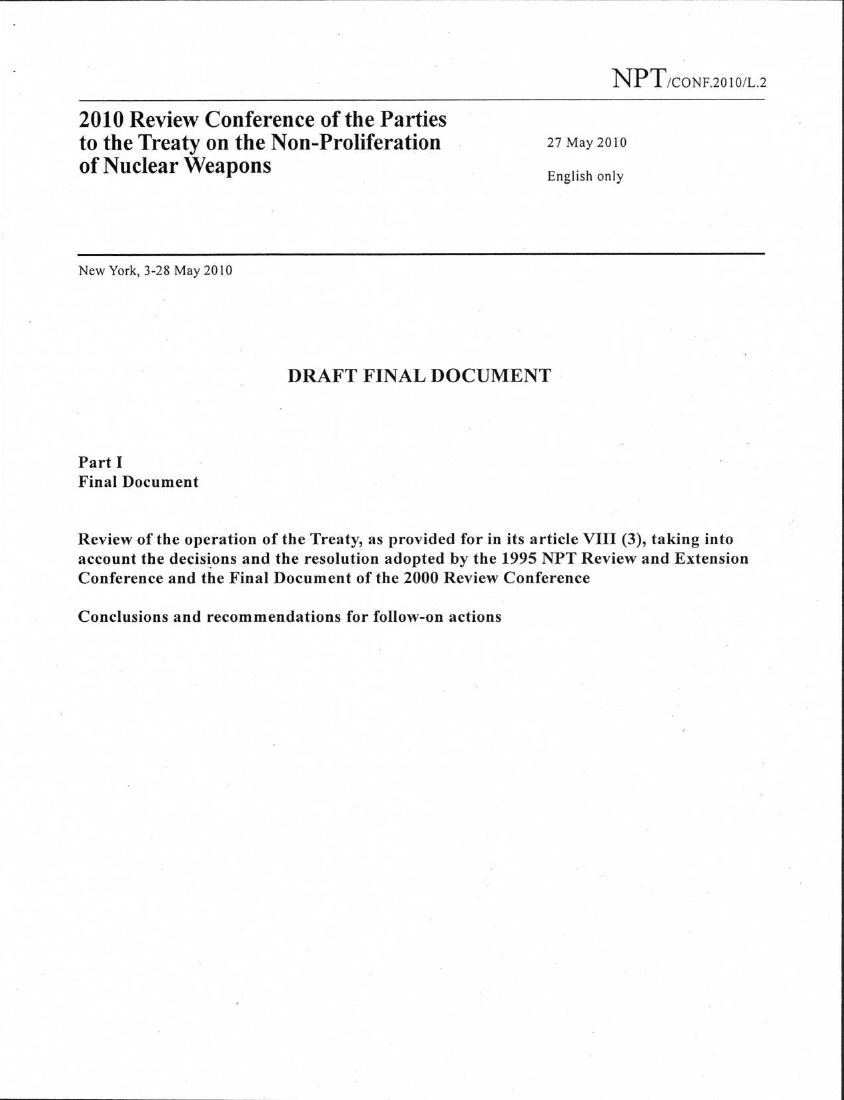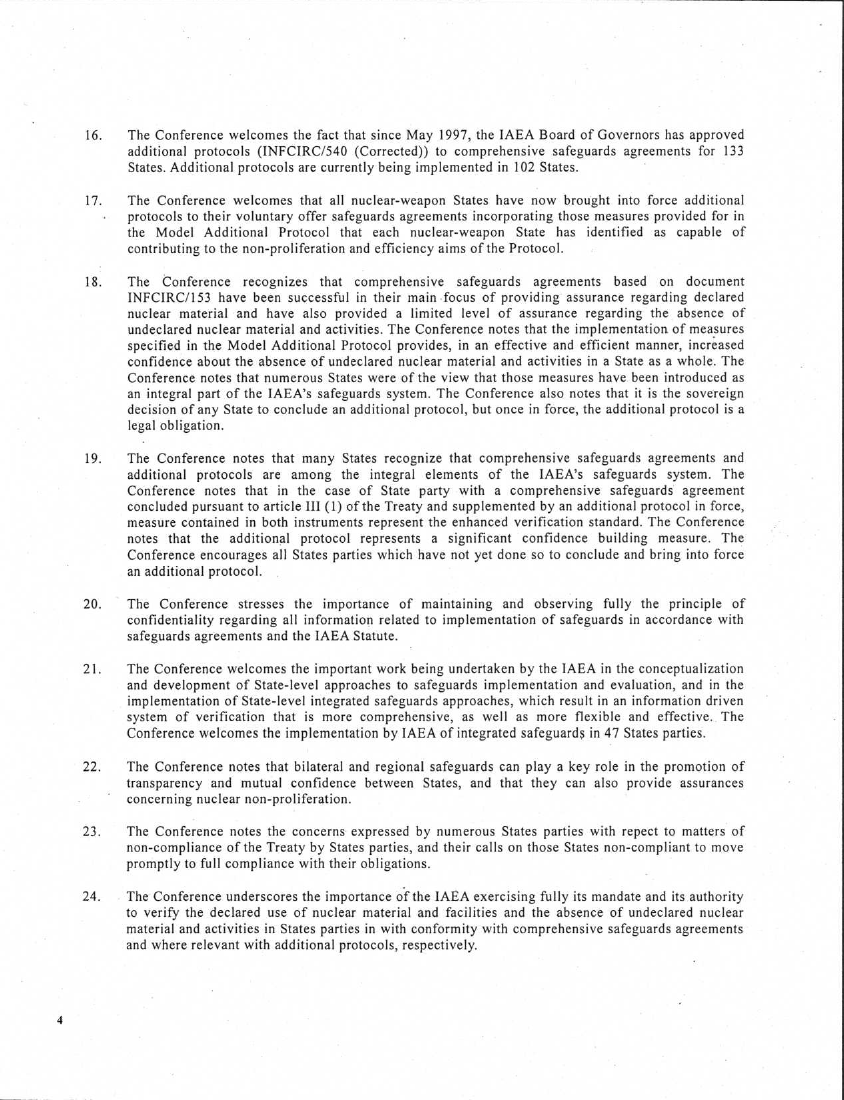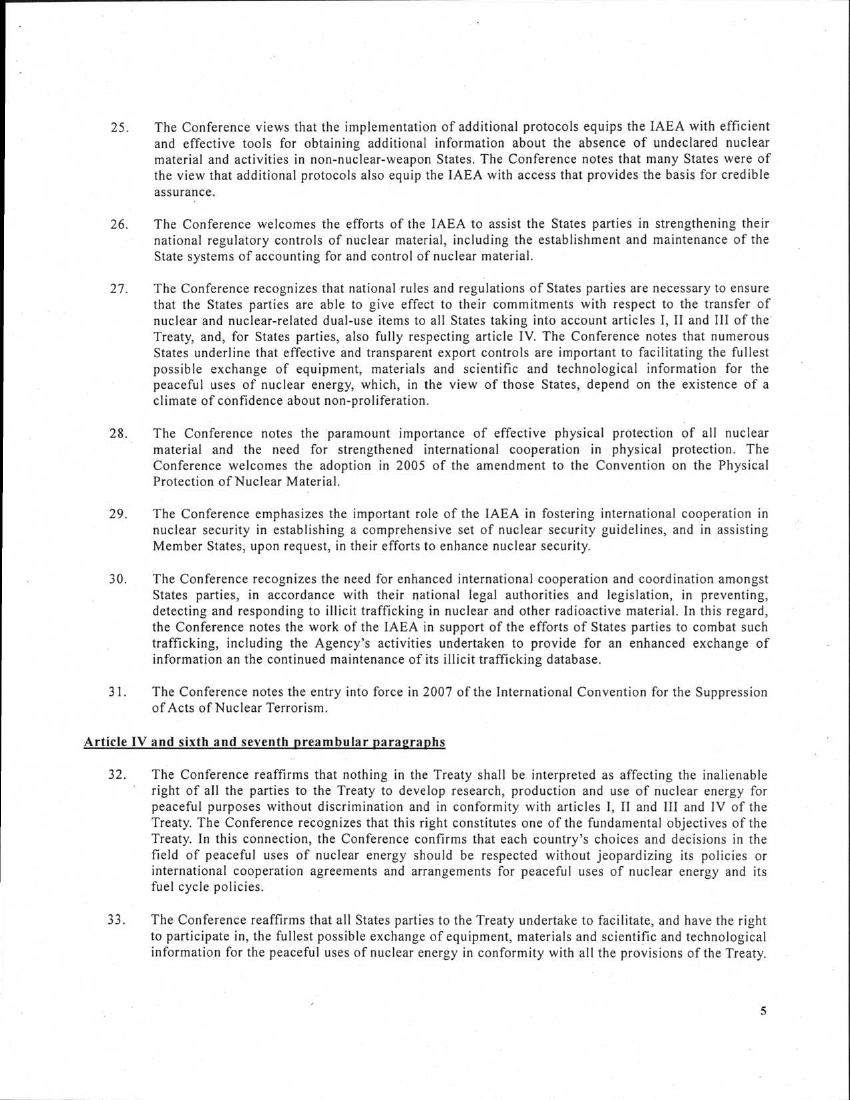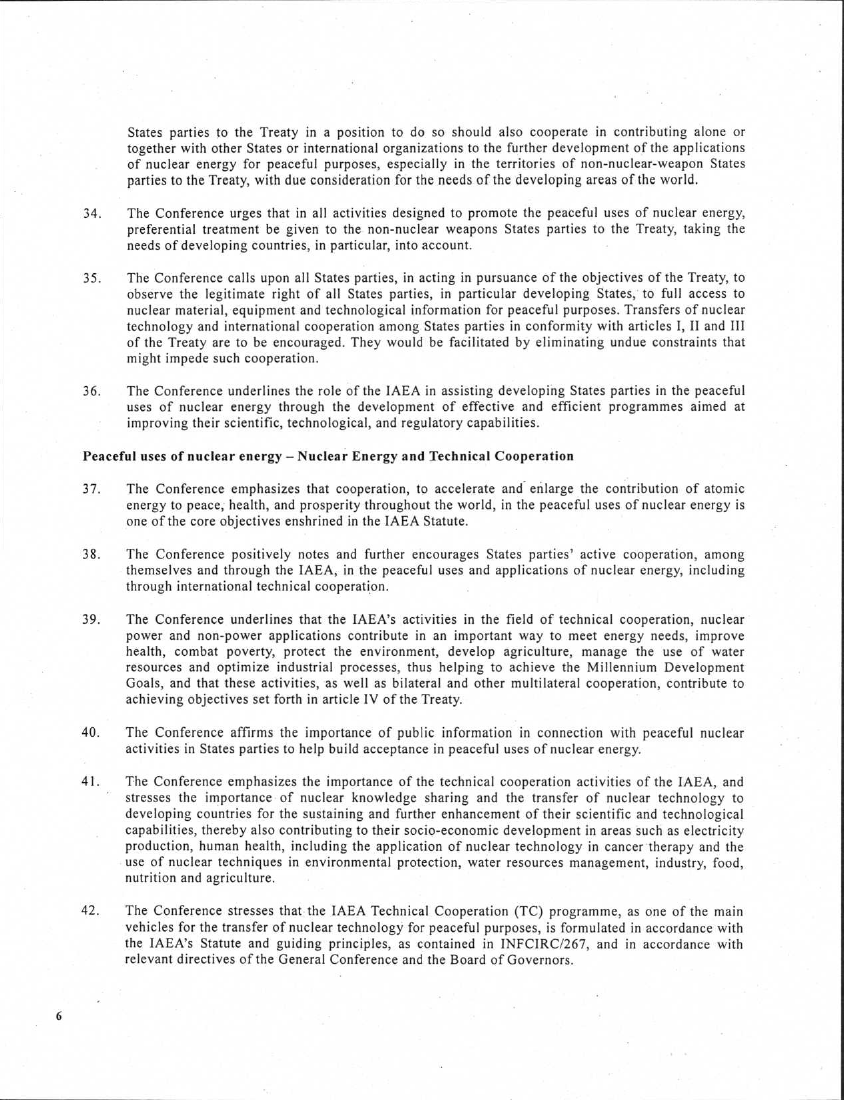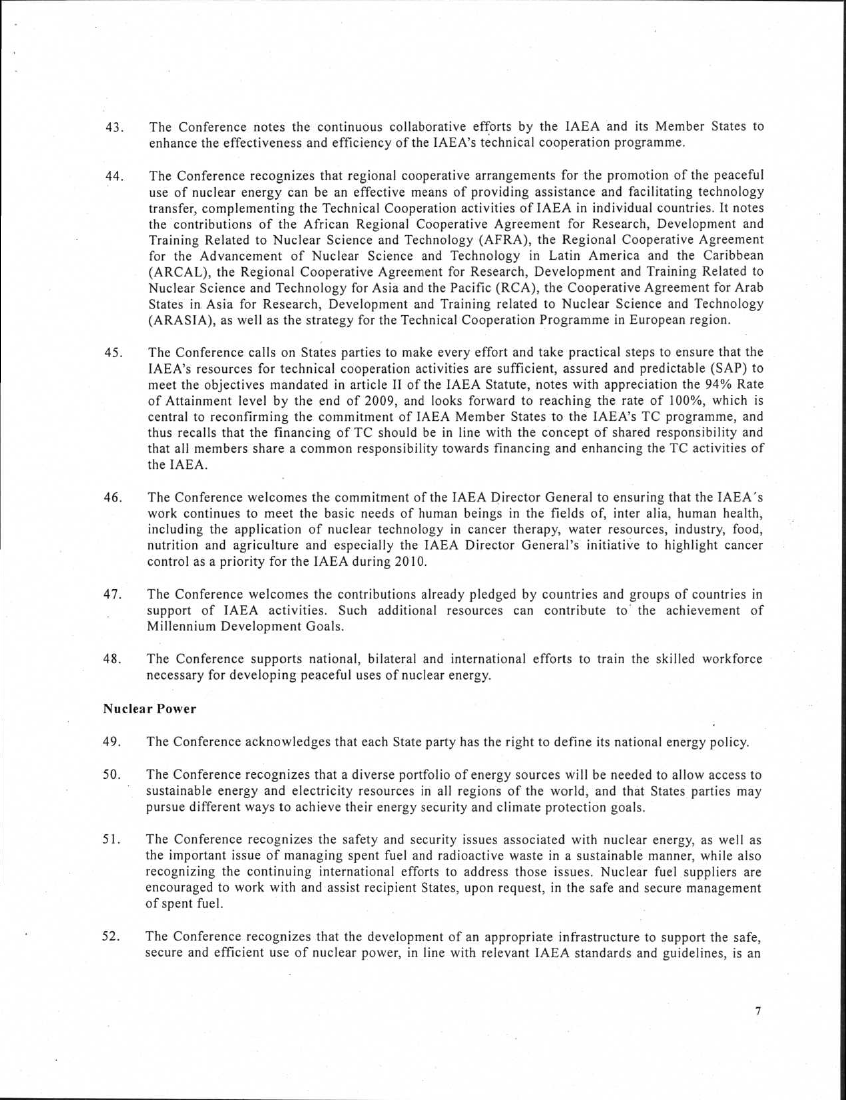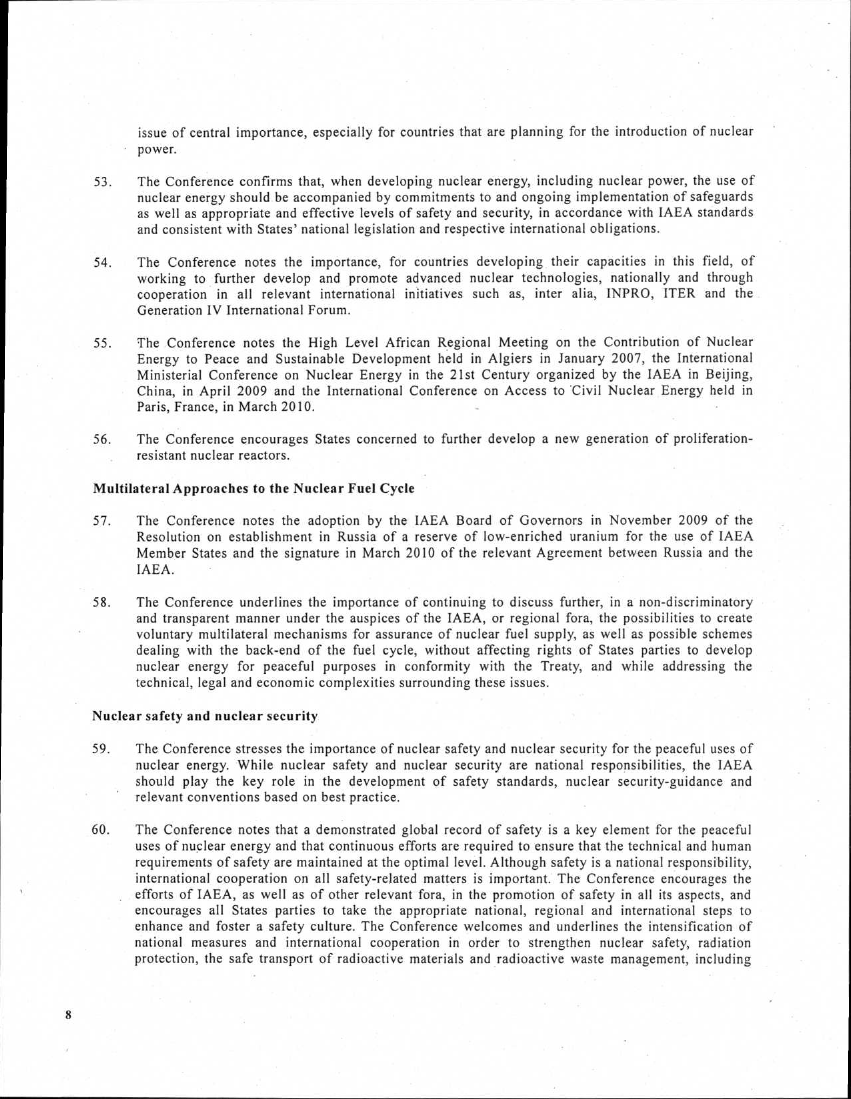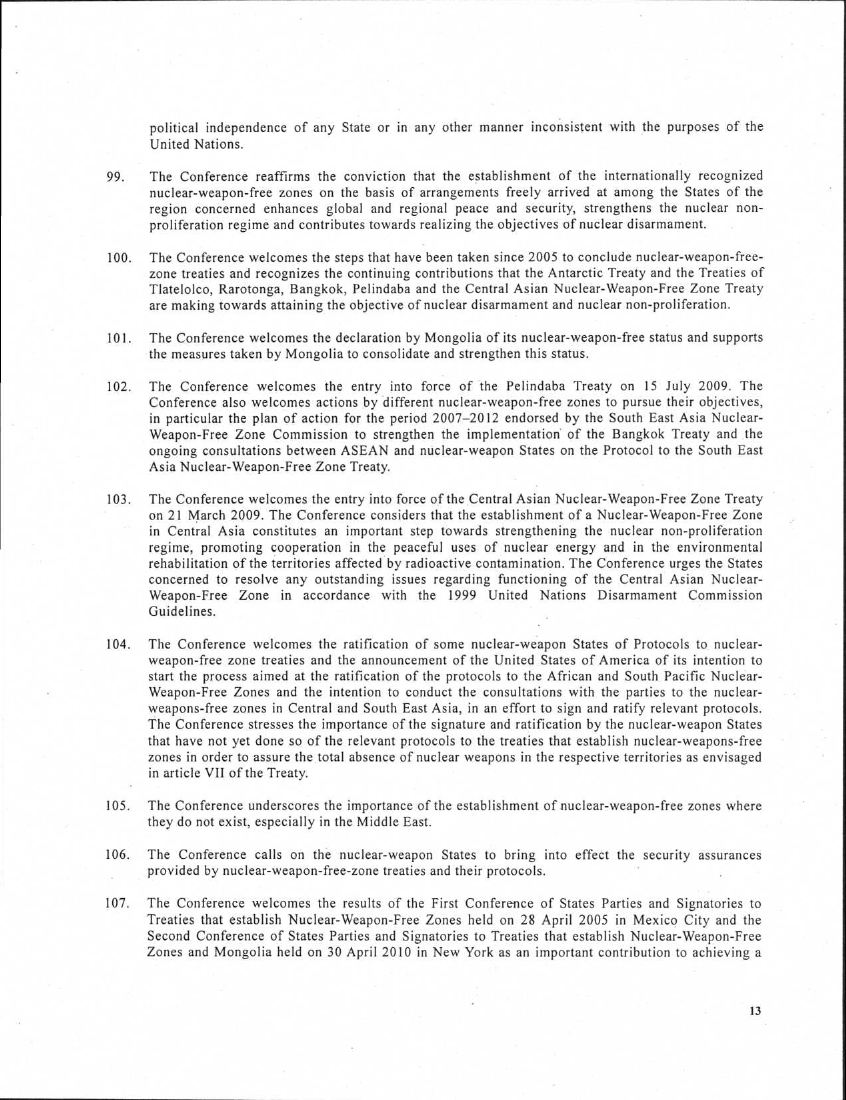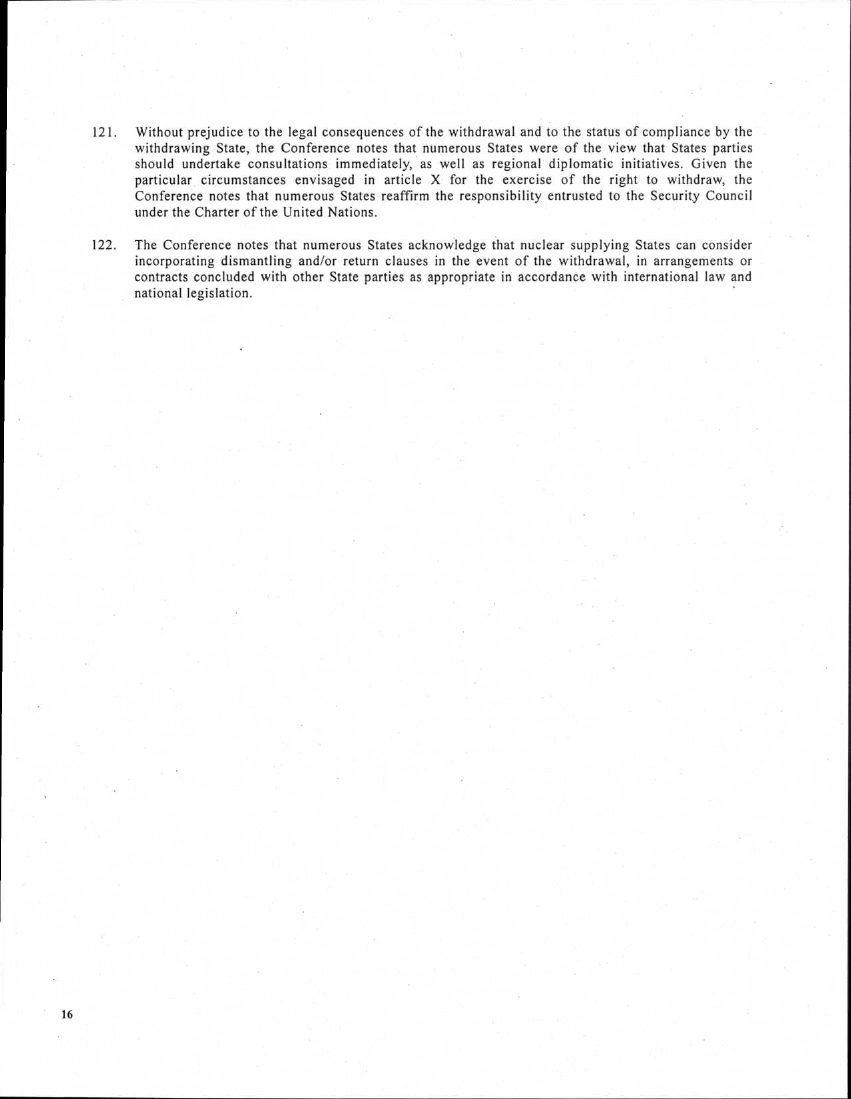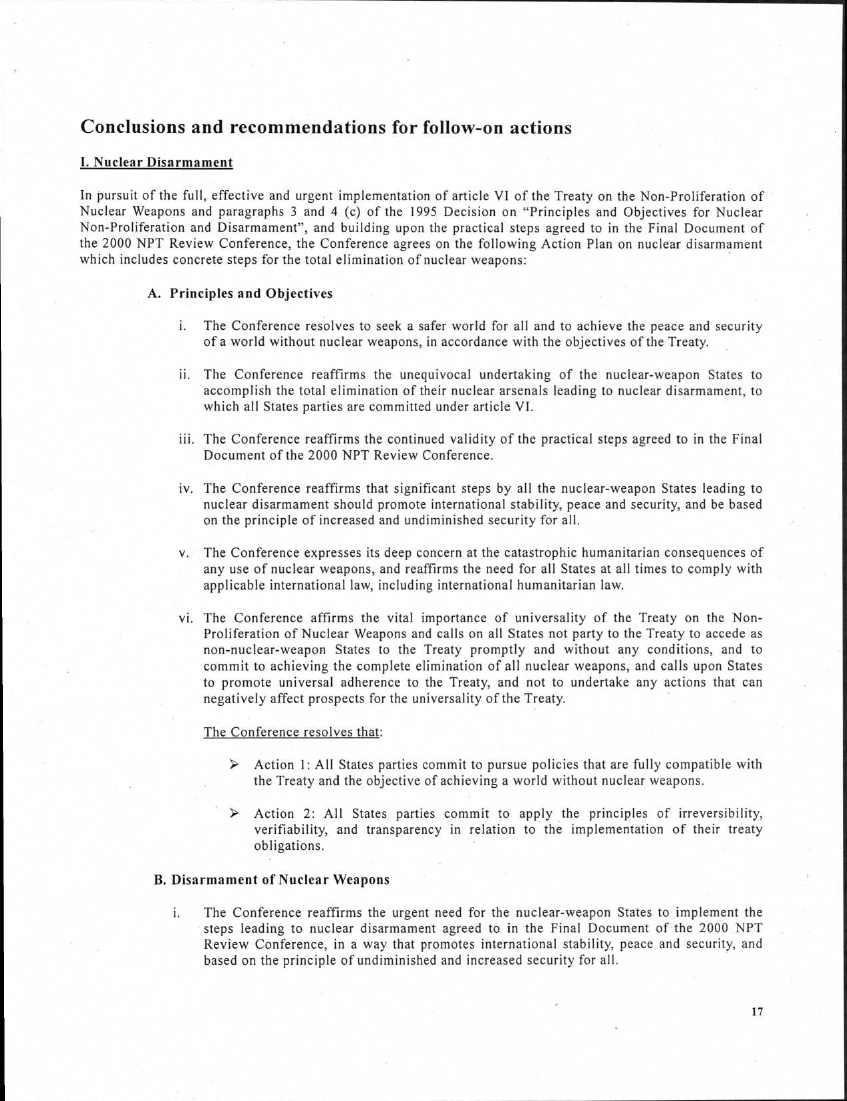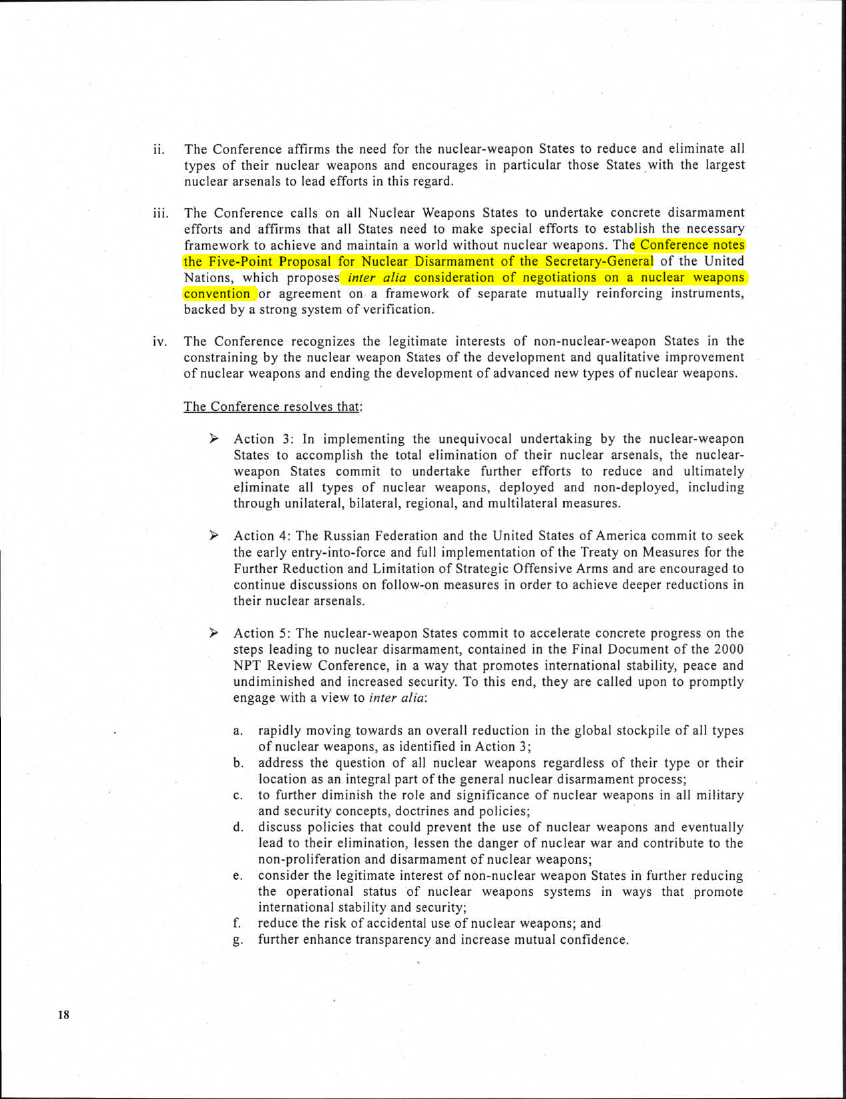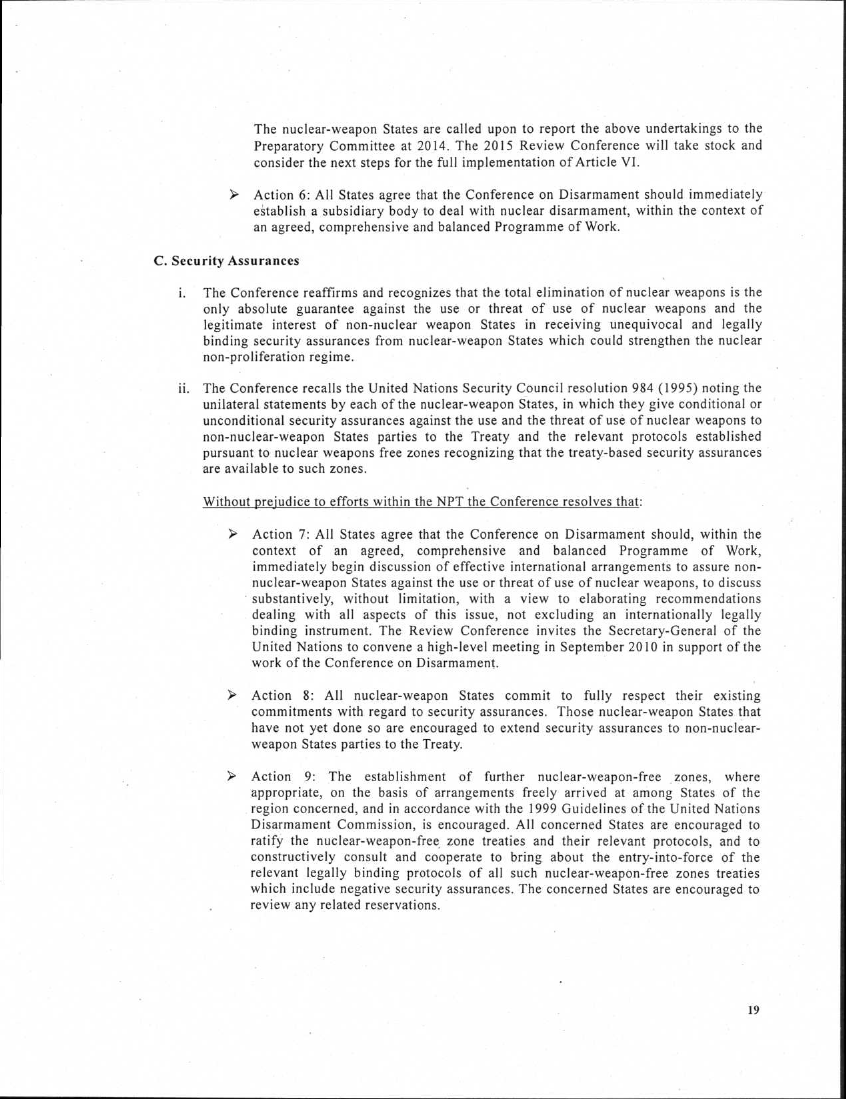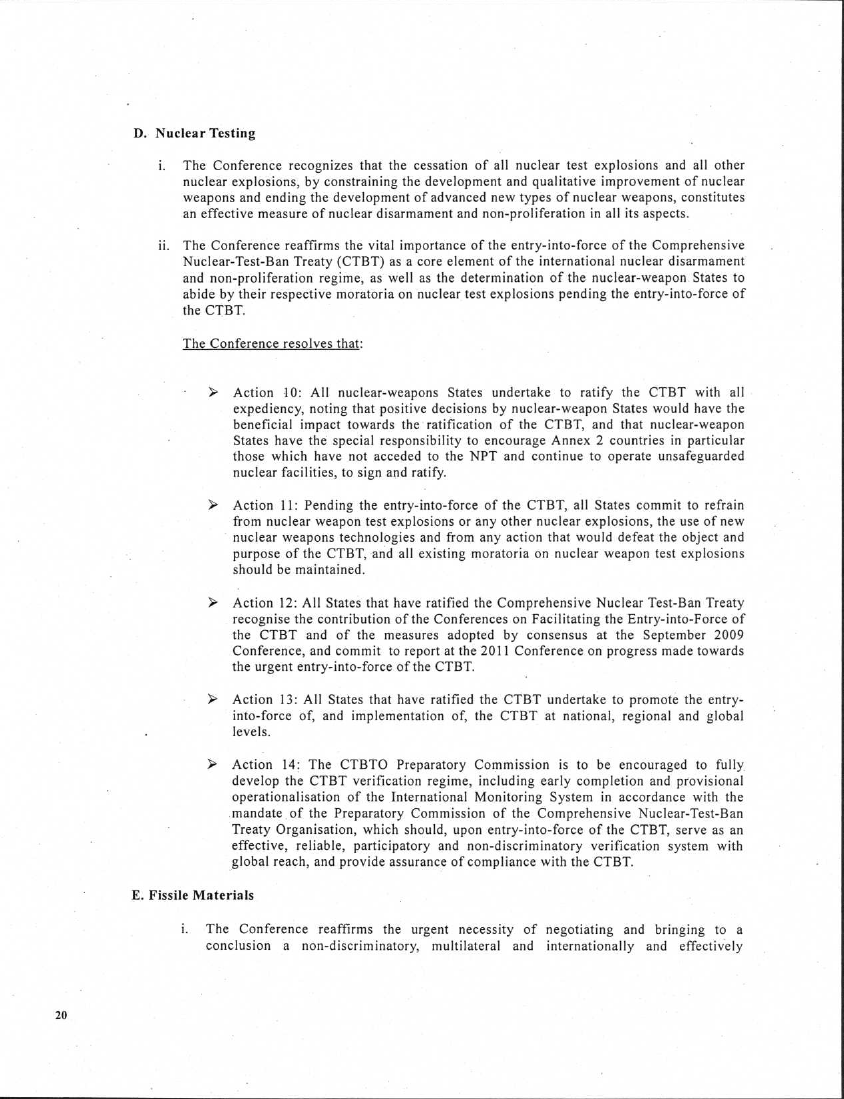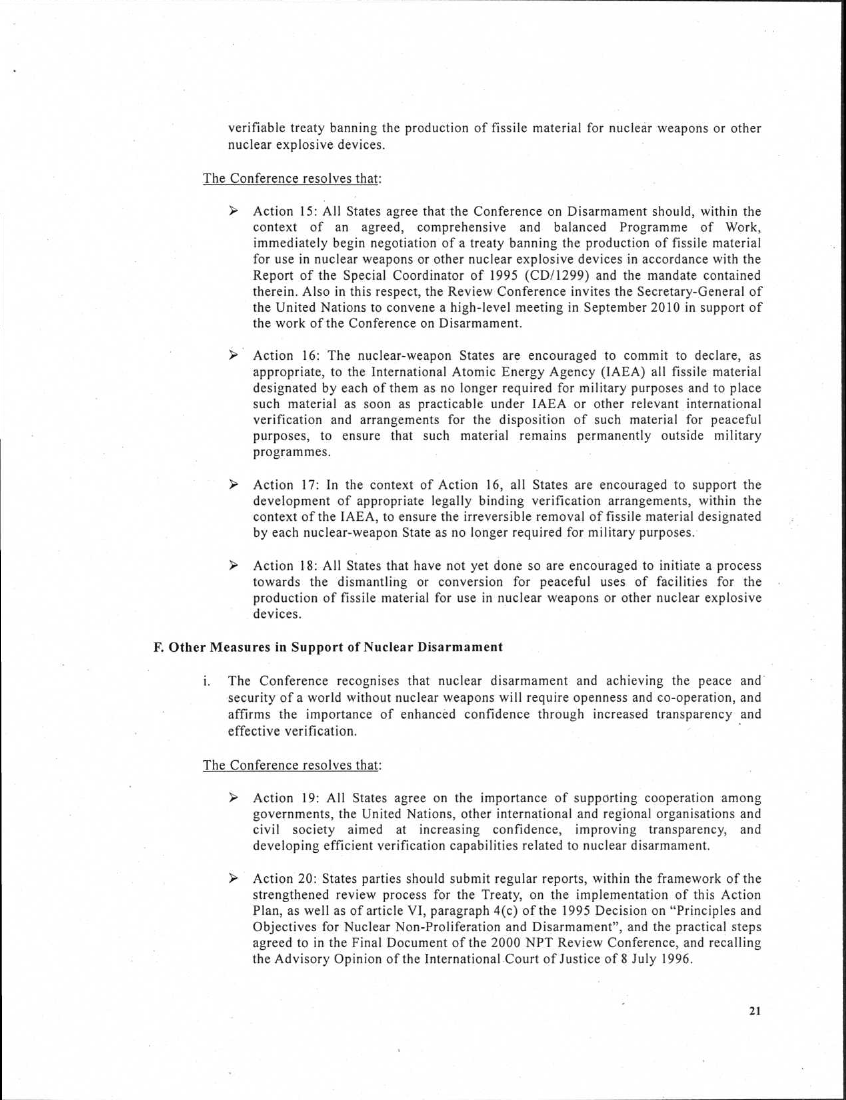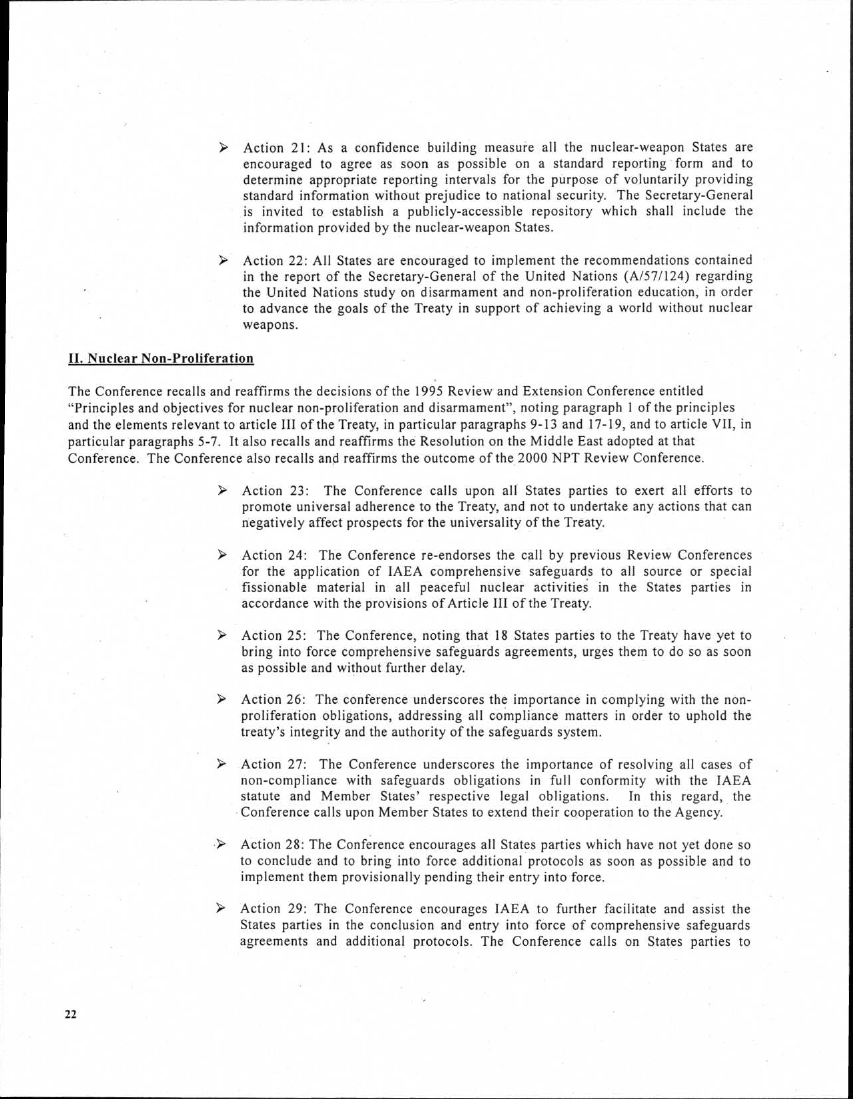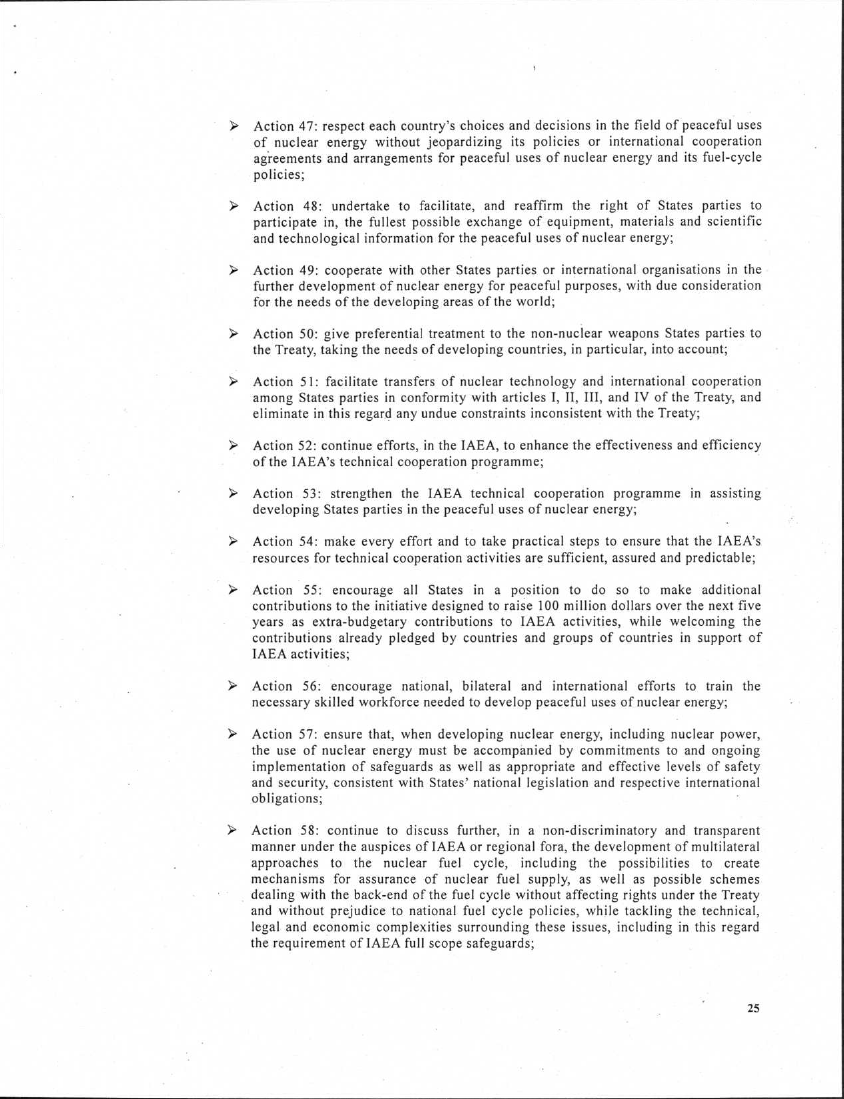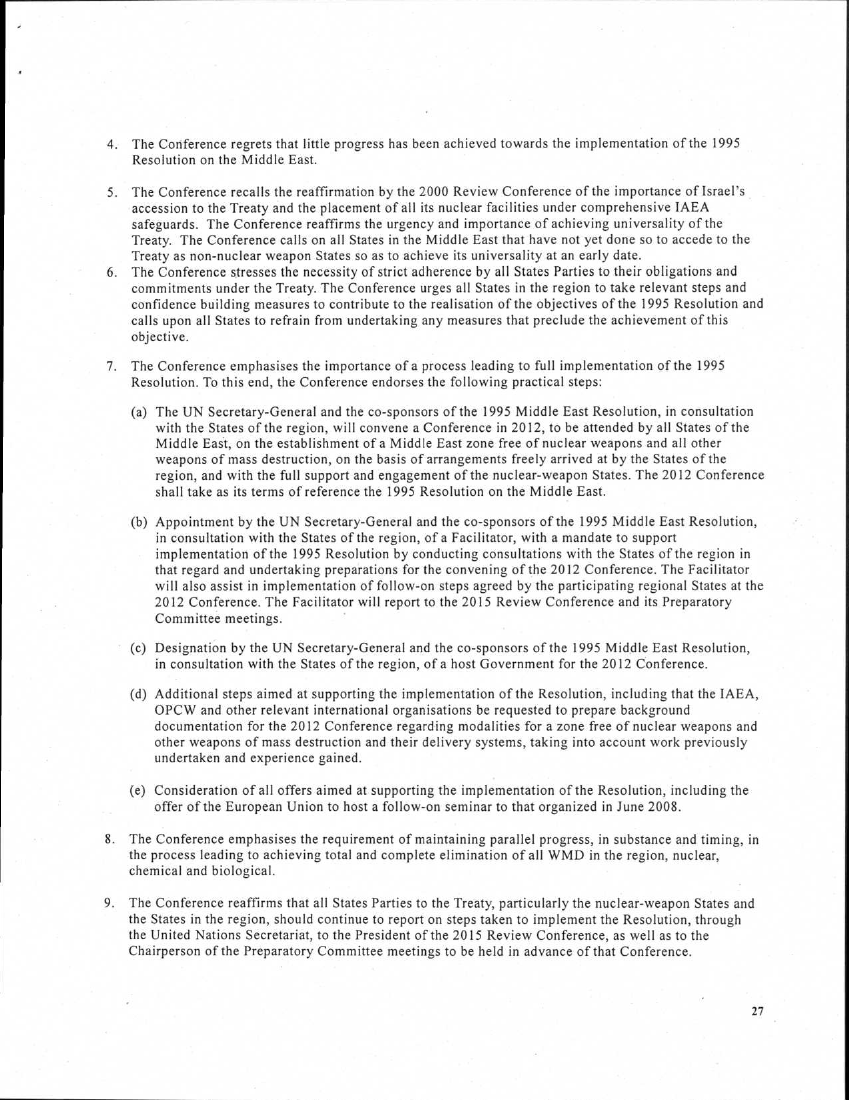Det Udenrigspolitiske Nævn 2009-10
Bilag 15
Offentligt
NP T/CONF.2010/L.2
2010 Review Conference of the Partiesto the Treaty on the Non-Proliferationof Nuclear Weapons
27 May 2010English only
New York, 3-28 May 2010
DRAFT FINAL DOCUMENT
Part IFinal DocumentReview of the operation of the Treaty, as provided for in its article VIII (3), taking intoaccount the decisions and the resolution adopted by the 1995 NPT Review and ExtensionConference and the Final Document of the 2000 Review ConferenceConclusions and recommendations for follow-on actions
Review of the operation of the Treaty, as provided for in its article VIII (3),taking into account the decisions and the resolution adopted by the 1995 NPTReview and Extension Conference and the Final Document of the 2000Review Conference'Articles I and II and first and third preambular paragraphs1.The Conference reaffirms that the full and effective implementation of the Treaty and the regime ofnon-proliferation in all its aspects has a vital role in promoting international peace and security. TheConference reaffirms that every effort should be made to implement the Treaty in all its aspects and toprevent the proliferation of nuclear weapons and other nuclear explosive devices, without hamperingthe peaceful uses of nuclear energy by States parties to the Treaty. The Conference remains convincedthat universal adherence to the Treaty and full compliance of all parties with all its provisions are thebest way to prevent the spread of nuclear weapons and other nuclear explosive devices.The Conference recalls that the overwhelming majority of States entered into legally bindingcommitments not to receive, manufacture or otherwise acquire nuclear weapons or other nuclearexplosive devices in the context,inter alia,of the corresponding legally binding commitments by thenuclear-weapon States to nuclear disarmament in accordance with the Treaty.The Conference notes that the nuclear-weapon States reaffirmed their commitment not to transfer toany recipient whatsoever nuclear weapons or other nuclear explosive devices, or control over suchweapons or explosive devices directly, or indirectly, and not in any way to assist, encourage or induceany non-nuclear-weapon State to manufacture or otherwise acquire nuclear weapons or other nuclearexplosive devices, or control over such weapons or explosive devices.The Conference notes that the non-nuclear-weapon States parties to the Treaty reaffirmed theircommitment not to receive the transfer from any transferor whatsoever of nuclear weapons or othernuclear explosive devices or of control over such weapons or explosive devices directly, or indirectly,not to manufacture or otherwise acquire nuclear weapons or other nuclear explosive devices, and notto seek or receive any assistance in the manufacture of nuclear weapons or other nuclear explosivedevices.The Conference reaffirms the commitment of States parties to the effective implementation of theobjectives and provisions of the Treaty, the decisions and resolution of the 1995 Review andExtension Conference adopted without a vote, and the final document of the 2000 ReviewConference, 2 adopted by consensus.The Conference reaffirms that the strict observance of all the provisions of the Treaty remains centralto achieving the shared objectives of the total elimination of nuclear weapons preventing, under anycircumstances, the further proliferation of nuclear weapons and preserving the Treaty's vitalcontribution to peace and security.The Conference emphasized that responses to concerns over compliance with any obligation under theTreaty by any State Party should be pursued by diplomatic means, in accordance with the provisionsof the Treaty and the Charter of the United Nations.
2.
3.
4.
5.
6.
7.
1
The review is the responsibility of the President and reflects to the best of his knowledge what transpired with regard to mattersof review.2NPT/CONF.2000/28.
2
8.
The Conference recognizes that breaches of the Treaty's obligations undermine nuclear disarmament,non-proliferation and peaceful uses of nuclear energy.The Conference condemns with the strongest possible terms the nuclear test explosions carried out bythe Democratic People's Republic of Korea in 2006 and 2009. The Conference recalls all relevantUnited Nations Security Council resolutions and that the Democratic People's Republic of Koreacannot have the status of a nuclear-weapon-State.
9.
Article III and fourth and fifth preambular paragraphs, especially in their relationship to article IV andthe sixth and seventh preambular paragraphs
10.
The Conference reaffirms that the International Atomic Energy Agency (IAEA) is the competentauthority responsible for verifying and assuring, in accordance with the Statute of the IAEA and theIAEA safeguards system, compliance by States parties with their safeguards agreements undertaken infulfillment of their obligations under article III, paragraph 1, of the Treaty with a view to preventingdiversion of nuclear energy from peaceful uses to nuclear weapons or other nuclear explosive devices.It is the conviction of the Conference that nothing should be done to undermine the authority of IAEAin this regard. States parties that have concerns regarding non-compliance with the safeguardsagreements of the Treaty by the States parties should direct such concerns, along with supportingevidence and information, to the IAEA to consider, investigate, draw conclusions and decide onnecessary actions in accordance with its mandate.The Conference reaffirms the importance of access to the United Nations Security Council and theGeneral. Assembly by the IAEA, including its Director General, in accordance with Article XII.C. ofthe Statute of IAEA and paragraph 19 of INFCIRC/153 (Corrected), and the role of the United NationsSecurity Council and the General Assembly, in accordance with the Charter of the United Nations, inupholding compliance with IAEA safeguards agreements and ensuring compliance with safeguardsobligations by taking appropriate measures in the case of any violations notified to it by the IAEA.The Conference recognizes that IAEA safeguards are a fundamental component of the nuclear non-proliferation regime, play an indispensable role in the implementation of the Treaty and help to createan environment conducive to nuclear cooperation.The Conference recalls paragraph 12 of Decision 2 ("Principles and objectives for nuclear non-proliferation and disarmament") of the 1995 Review and Extension Conference, which provides thatnew supply arrangements for the transfer of source or special fissionable material or equipment ormaterial especially designed or prepared for the processing, use, or production of special fissionablematerial to non-nuclear-weapon States should require, as a necessary precondition, acceptance of thecomprehensive IAEA safeguards and internationally legally binding commitments not to acquirenuclear weapons or other nuclear explosive devices.The Conference reaffirms that the implementation of comprehensive safeguards agreements pursuantto article III, paragraph 1, of the Treaty should be designed to provide for verification by IAEA of thecorrectness and completeness of a State's declaration so that there is a credible assurances of the non-diversion of nuclear material from declared activities and of the absence of undeclared nuclearmaterial and activities.The Conference welcomes that 166 States have brought into force comprehensive safeguardsagreements with IAEA in compliance with article III, paragraph 4, of the Treaty.
11.
12.
13.
14.
15.
3
16.
The Conference welcomes the fact that since May 1997, the IAEA Board of Governors has approvedadditional protocols (INFCIRC/540 (Corrected)) to comprehensive safeguards agreements for 133States. Additional protocols are currently being implemented in 102 States.The Conference welcomes that all nuclear-weapon States have now brought into force additionalprotocols to their voluntary offer safeguards agreements incorporating those measures provided for inthe Model Additional Protocol that each nuclear-weapon State has identified as capable ofcontributing to the non-proliferation and efficiency aims of the Protocol.The Conference recognizes that comprehensive safeguards agreements based on documentINFCIRC/153 have been successful in their main focus of providing assurance regarding declarednuclear material and have also provided a limited level of assurance regarding the absence ofundeclared nuclear material and activities. The Conference notes that the implementation of measuresspecified in the Model Additional Protocol provides, in an effective and efficient manner, increasedconfidence about the absence of undeclared nuclear material and activities in a State as a whole. TheConference notes that numerous States were of the view that those measures have been introduced asan integral part of the IAEA's safeguards system. The Conference also notes that it is the sovereigndecision of any State to conclude an additional protocol, but once in force, the additional protocol is alegal obligation.The Conference notes that many States recognize that comprehensive safeguards agreements andadditional protocols are among the integral elements of the IAEA's safeguards system. TheConference notes that in the case of State party with a comprehensive safeguards agreementconcluded pursuant to article III (1) of the Treaty and supplemented by an additional protocol in force,measure contained in both instruments represent the enhanced verification standard. The Conferencenotes that the additional protocol represents a significant confidence building measure. TheConference encourages all States parties which have not yet done so to conclude and bring into forcean additional protocol.The Conference stresses the importance of maintaining and observing fully the principle ofconfidentiality regarding all information related to implementation of safeguards in accordance withsafeguards agreements and the IAEA Statute.The Conference welcomes the important work being undertaken by the IAEA in the conceptualizationand development of State-level approaches to safeguards implementation and evaluation, and in theimplementation of State-level integrated safeguards approaches, which result in an information drivensystem of verification that is more comprehensive, as well as more flexible and effective. TheConference welcomes the implementation by IAEA of integrated safeguards in 47 States parties.The Conference notes that bilateral and regional safeguards can play a key role in the promotion oftransparency and mutual confidence between States, and that they can also provide assurancesconcerning nuclear non-proliferation.The Conference notes the concerns expressed by numerous States parties with repect to matters ofnon-compliance of the Treaty by States parties, and their calls on those States non-compliant to movepromptly to full compliance with their obligations.The Conference underscores the importance of the IAEA exercising fully its mandate and its authorityto verify the declared use of nuclear material and facilities and the absence of undeclared nuclearmaterial and activities in States parties in with conformity with comprehensive safeguards agreementsand where relevant with additional protocols, respectively.
17.
18.
19.
20.
21.
22.
23.
24.
4
25.
The Conference views that the implementation of additional protocols equips the IAEA with efficientand effective tools for obtaining additional information about the absence of undeclared nuclearmaterial and activities in non-nuclear-weapon States. The Conference notes that many States were ofthe view that additional protocols also equip the IAEA with access that provides the basis for credibleassurance.The Conference welcomes the efforts of the IAEA to assist the States parties in strengthening theirnational regulatory controls of nuclear material, including the establishment and maintenance of theState systems of accounting for and control of nuclear material.The Conference recognizes that national rules and regulations of States parties are necessary to ensurethat the States parties are able to give effect to their commitments with respect to the transfer ofnuclear and nuclear-related dual-use items to all States taking into account articles I, II and III of theTreaty, and, for States parties, also fully respecting article IV. The Conference notes that numerousStates underline that effective and transparent export controls are important to facilitating the fullestpossible exchange of equipment, materials and scientific and technological information for thepeaceful uses of nuclear energy, which, in the view of those States, depend on the existence of aclimate of confidence about non-proliferation.The Conference notes the paramount importance of effective physical protection of all nuclearmaterial and the need for strengthened international cooperation in physical protection. TheConference welcomes the adoption in 2005 of the amendment to the Convention on the PhysicalProtection of Nuclear Material.The Conference emphasizes the important role of the IAEA in fostering international cooperation innuclear security in establishing a comprehensive set of nuclear security guidelines, and in assistingMember States, upon request, in their efforts to enhance nuclear security.The Conference recognizes the need for enhanced international cooperation and coordination amongstStates parties, in accordance with their national legal authorities and legislation, in preventing,detecting and responding to illicit trafficking in nuclear and other radioactive material. In this regard,the Conference notes the work of the IAEA in support of the efforts of States parties to combat suchtrafficking, including the Agency's activities undertaken to provide for an enhanced exchange ofinformation an the continued maintenance of its illicit trafficking database.The Conference notes the entry into force in 2007 of the International Convention for the Suppressionof Acts of Nuclear Terrorism.
26.
27.
28.
29.
30.
31.
Article IV and sixth and seventh preambular paragraphs32.The Conference reaffirms that nothing in the Treaty shall be interpreted as affecting the inalienableright of all the parties to the Treaty to develop research, production and use of nuclear energy forpeaceful purposes without discrimination and in conformity with articles I, II and III and IV of theTreaty. The Conference recognizes that this right constitutes one of the fundamental objectives of theTreaty. In this connection, the Conference confirms that each country's choices and decisions in thefield of peaceful uses of nuclear energy should be respected without jeopardizing its policies orinternational cooperation agreements and arrangements for peaceful uses of nuclear energy and itsfuel cycle policies.The Conference reaffirms that all States parties to the Treaty undertake to facilitate, and have the rightto participate in, the fullest possible exchange of equipment, materials and scientific and technologicalinformation for the peaceful uses of nuclear energy in conformity with all the provisions of the Treaty.
33.
States parties to the Treaty in a position to do so should also cooperate in contributing alone ortogether with other States or international organizations to the further development of the applicationsof nuclear energy for peaceful purposes, especially in the territories of non-nuclear-weapon Statesparties to the Treaty, with due consideration for the needs of the developing areas of the world.34.The Conference urges that in all activities designed to promote the peaceful uses of nuclear energy,preferential treatment be given to the non-nuclear weapons States parties to the Treaty, taking theneeds of developing countries, in particular, into account.The Conference calls upon all States parties, in acting in pursuance of the objectives of the Treaty, toobserve the legitimate right of all States parties, in particular developing States, to full access tonuclear material, equipment and technological information for peaceful purposes. Transfers of nucleartechnology and international cooperation among States parties in conformity with articles I, II and IIIof the Treaty are to be encouraged. They would be facilitated by eliminating undue constraints thatmight impede such cooperation.The Conference underlines the role of the IAEA in assisting developing States parties in the peacefuluses of nuclear energy through the development of effective and efficient programmes aimed atimproving their scientific, technological, and regulatory capabilities.
35.
36.
Peaceful uses of nuclear energy — Nuclear Energy and Technical Cooperation37.The Conference emphasizes that cooperation, to accelerate and enlarge the contribution of atomicenergy to peace, health, and prosperity throughout the world, in the peaceful uses of nuclear energy isone of the core objectives enshrined in the IAEA Statute.The Conference positively notes and further encourages States parties' active cooperation, amongthemselves and through the IAEA, in the peaceful uses and applications of nuclear energy, includingthrough international technical cooperation.The Conference underlines that the IAEA's activities in the field of technical cooperation, nuclearpower and non-power applications contribute in an important way to meet energy needs, improvehealth, combat poverty, protect the environment, develop agriculture, manage the use of waterresources and optimize industrial processes, thus helping to achieve the Millennium DevelopmentGoals, and that these activities, as well as bilateral and other multilateral cooperation, contribute toachieving objectives set forth in article IV of the Treaty.The Conference affirms the importance of public information in connection with peaceful nuclearactivities in States parties to help build acceptance in peaceful uses of nuclear energy.The Conference emphasizes the importance of the technical cooperation activities of the IAEA, andstresses the importance of nuclear knowledge sharing and the transfer of nuclear technology todeveloping countries for the sustaining and further enhancement of their scientific and technologicalcapabilities, thereby also contributing to their socio-economic development in areas such as electricityproduction, human health, including the application of nuclear technology in cancer therapy and theuse of nuclear techniques in environmental protection, water resources management, industry, food,nutrition and agriculture.The Conference stresses that the IAEA Technical Cooperation (TC) programme, as one of the mainvehicles for the transfer of nuclear technology for peaceful purposes, is formulated in accordance withthe IAEA's Statute and guiding principles, as contained in INFCIRC/267, and in accordance withrelevant directives of the General Conference and the Board of Governors.
38.
39.
40.
41.
42.
6
43.
The Conference notes the continuous collaborative efforts by the IAEA and its Member States toenhance the effectiveness and efficiency of the IAEA's technical cooperation programme.The Conference recognizes that regional cooperative arrangements for the promotion of the peacefuluse of nuclear energy can be an effective means of providing assistance and facilitating technologytransfer, complementing the Technical Cooperation activities of IAEA in individual countries. It notesthe contributions of the African Regional Cooperative Agreement for Research, Development andTraining Related to Nuclear Science and Technology (AFRA), the Regional Cooperative Agreementfor the Advancement of Nuclear Science and Technology in Latin America and the Caribbean(ARCAL), the Regional Cooperative Agreement for Research, Development and Training Related toNuclear Science and Technology for Asia and the Pacific (RCA), the Cooperative Agreement for ArabStates in Asia for Research, Development and Training related to Nuclear Science and Technology(ARASIA), as well as the strategy for the Technical Cooperation Programme in European region.The Conference calls on States parties to make every effort and take practical steps to ensure that theIAEA's resources for technical cooperation activities are sufficient, assured and predictable (SAP) tomeet the objectives mandated in article II of the IAEA Statute, notes with appreciation the 94% Rateof Attainment level by the end of 2009, and looks forward to reaching the rate of 100%, which iscentral to reconfirming the commitment of IAEA Member States to the IAEA's TC programme, andthus recalls that the financing of TC should be in line with the concept of shared responsibility andthat all members share a common responsibility towards financing and enhancing the TC activities ofthe IAEA.The Conference welcomes the commitment of the IAEA Director General to ensuring that the IAEA'swork continues to meet the basic needs of human beings in the fields of, inter alia, human health,including the application of nuclear technology in cancer therapy, water resources, industry, food,nutrition and agriculture and especially the IAEA Director General's initiative to highlight cancercontrol as a priority for the IAEA during 2010.The Conference welcomes the contributions already pledged by countries and groups of countries insupport of IAEA activities. Such additional resources can contribute to the achievement ofMillennium Development Goals.The Conference supports national, bilateral and international efforts to train the skilled workforcenecessary for developing peaceful uses of nuclear energy.
44.
45.
46.
47.
48.
Nuclear Power49.50.The Conference acknowledges that each State party has the right to define its national energy policy.The Conference recognizes that a diverse portfolio of energy sources will be needed to allow access tosustainable energy and electricity resources in all regions of the world, and that States parties maypursue different ways to achieve their energy security and climate protection goals.The Conference recognizes the safety and security issues associated with nuclear energy, as well asthe important issue of managing spent fuel and radioactive waste in a sustainable manner, while alsorecognizing the continuing international efforts to address those issues. Nuclear fuel suppliers areencouraged to work with and assist recipient States, upon request, in the safe and secure managementof spent fuel.The Conference recognizes that the development of an appropriate infrastructure to support the safe,secure and efficient use of nuclear power, in line with relevant IAEA standards and guidelines, is an
51.
52.
7
issue of central importance, especially for countries that are planning for the introduction of nuclearpower.53.The Conference confirms that, when developing nuclear energy, including nuclear power, the use ofnuclear energy should be accompanied by commitments to and ongoing implementation of safeguardsas well as appropriate and effective levels of safety and security, in accordance with IAEA standardsand consistent with States' national legislation and respective international obligations.The Conference notes the importance, for countries developing their capacities in this field, ofworking to further develop and promote advanced nuclear technologies, nationally and throughcooperation in all relevant international initiatives such as, inter alia, INPRO, ITER and theGeneration IV International Forum.The Conference notes the High Level African Regional Meeting on the Contribution of NuclearEnergy to Peace and Sustainable Development held in Algiers in January 2007, the InternationalMinisterial Conference on Nuclear Energy in the 21st Century organized by the IAEA in Beijing,China, in April 2009 and the International Conference on Access to Civil Nuclear Energy held inParis, France, in March 2010.The Conference encourages States concerned to further develop a new generation of proliferation-resistant nuclear reactors.
54.
55.
56.
Multilateral Approaches to the Nuclear Fuel Cycle57.The Conference notes the adoption by the IAEA Board of Governors in November 2009 of theResolution on establishment in Russia of a reserve of low-enriched uranium for the use of IAEAMember States and the signature in March 2010 of the relevant Agreement between Russia and theIAEA.The Conference underlines the importance of continuing to discuss further, in a non-discriminatoryand transparent manner under the auspices of the IAEA, or regional fora, the possibilities to createvoluntary multilateral mechanisms for assurance of nuclear fuel supply, as well as possible schemesdealing with the back-end of the fuel cycle, without affecting rights of States parties to developnuclear energy for peaceful purposes in conformity with the Treaty, and while addressing thetechnical, legal and economic complexities surrounding these issues.
58.
Nuclear safety and nuclear security59.The Conference stresses the importance of nuclear safety and nuclear security for the peaceful uses ofnuclear energy. While nuclear safety and nuclear security are national responsibilities, the IAEAshould play the key role in the development of safety standards, nuclear security-guidance andrelevant conventions based on best practice.The Conference notes that a demonstrated global record of safety is a key element for the peacefuluses of nuclear energy and that continuous efforts are required to ensure that the technical and humanrequirements of safety are maintained at the optimal level. Although safety is a national responsibility,international cooperation on all safety-related matters is important. The Conference encourages theefforts of IAEA, as well as of other relevant fora, in the promotion of safety in all its aspects, andencourages all States parties to take the appropriate national, regional and international steps toenhance and foster a safety culture. The Conference welcomes and underlines the intensification ofnational measures and international cooperation in order to strengthen nuclear safety, radiationprotection, the safe transport of radioactive materials and radioactive waste management, including
60.
8
activities conducted in this area by the IAEA. In this regard, the Conference recalls that special effortsshould be made and sustained to increase awareness in these fields, through participation of Statesparties, particularly those from developing countries in training, workshops, seminars and capacitybuilding in a non-discriminatory manner.61.The Conference acknowledges the primary responsibility of individual States for maintaining thesafety of their nuclear installations, and the crucial importance of an adequate national technical,human and regulatory infrastructure in nuclear safety, radiological protection and spent fuel andradioactive waste management, as well as an independent and effective regulatory body.The Conference encourages all States that have not yet done so to become party to the Convention onNuclear Safety, the Convention on Early Notification of a Nuclear Accident and the Convention onAssistance in the Case of a Nuclear Accident or Radiological Emergency, the Joint Convention on theSafety of Spent Fuel Management and on the Safety of Radioactive Waste Management.The Conference endorses the principles and objectives of the non-legally-binding Code of Conduct onthe Safety and Security of Radioactive Sources and Code of Conduct on the Safety of ResearchReactors, and underlines the important role of the supplementary Guidance on the Import and Exportof Radioactive Sources.The Conference encourages all States that have not done so to become party to the Convention on thePhysical Protection of Nuclear Material and to ratify its amendment so that it may enter into force atan early date.The Conference encourages all States that have not yet done so to become party to the InternationalConvention for the Suppression of Acts of Nuclear Terrorism.The Conference notes the Nuclear Security Summit held in Washington in April 2010.The Conference welcomes the efforts by State parties on a voluntary basis to minimize the use ofhighly enriched uranium in the civilian sector.The Conference recognizes the importance of applying best practice and basic principles, asdeveloped by the IAEA, in mining and processing, including those related to environmentalmanagement of uranium mining.The Conference underlines the fundamental importance of sustainable programmes, throughinternational efforts, such as the IAEA, and regional and national efforts, for education and training innuclear, radiation, transport, waste safety and nuclear security, while focusing on building institutionalcapacity and technical and managerial capabilities in States parties.The Conference encourages State parties to promote the sharing of best practices in the area of nuclearsafety and nuclear security, including through dialogue with the nuclear industry and the privatesector, as appropriate.The Conference welcomes the attention to problems of safety and contaimination related to thediscontinuation of nuclear operations formerly associated with nuclear-weapons programmes,including where appropriate, safe resettlement of any displaced human populations and the restorationof economic productivity to affected areas.The Conference encourages all governments and international organizations that have expertise in thefield of cleanup and disposal of radioactive contaminants to consider giving appropriate assistance as
62.
63.
64.
65.
66.67.
68.
69.
70.
71.
72.
9
may be requested for remedial purposes in these affected areas, while noting the efforts that have beenmade to date in this regard.Safe transport of radioactive materials73.The Conference recognizes that, historically, the safety record of civilian transport, includingmaritime transport, of radioactive materials has been excellent, and stresses the importance ofinternational cooperation to maintain and enhance the safety of international transport.The Conference reaffirms maritime and air navigation rights and freedoms, as provided for ininternational law and as reflected in relevant international instruments.The Conference endorses the IAEA standards for the safe transport of radioactive material and affirmsthat it is in the interests of all States parties that the transportation of radioactive materials continue tobe conducted consistent with international standards of safety, security and environmental protectionstandards and guidelines. The Conference takes note of the concerns of small island developing Statesand other coastal States with regard to the transportation of radioactive materials by sea and, in thisregard, welcomes efforts to improve communication between shipping and coastal States for thepurpose of addressing concerns regarding transport safety, security and emergency preparedness.
74.
75.
Armed attacks against nuclear installations devoted to peaceful purposes76.The Conference considers that attacks or threats of attack on nuclear facilities devoted to peacefulpurposes jeopardize nuclear safety, have dangerous political, economic and environmentalimplications and raise serious concerns regarding the application of international law on the use offorce in such cases, which could warrant appropriate action in accordance with the provisions of theCharter of the United Nations. The Conference notes that a majority of States parties have suggested alegally binding instrument be considered in this regard.
Nuclear Liability77.The Conference recalls the Paris Convention on Third Party Liability in the Field of Nuclear Energy,the Vienna Convention on Civil Liability for Nuclear Damage, the Brussels Conventionsupplementary to the Paris Convention, the Joint Protocol Related to the Application of the ViennaConvention and the Paris Convention and the protocols amending these conventions, and theobjectives thereof, and noting also the intention of the Convention on Supplementary Compensationfor Nuclear Damage to establish a worldwide nuclear liability regime based on the principles ofnuclear liability law, without prejudice to other liability regimes.The Conference recognizes the importance of having in place effective and coherent nuclear liabilitymechanisms at the national and global levels to provide compensation, if necessary, for damage interalia to people, property and the environment due to a nuclear accident or incident, taking fully intoaccount legal and technical considerations, and believing that the principle of strict liability shouldapply in the event of a nuclear accident or incident, including during the transport of radioactivematerial. (Source: GC(53)/RES/10)
78.
Article V79.The Conference affirms that the provisions of article V of the Treaty as regards the peacefulapplications of any nuclear explosions are to be interpreted in the light of the Comprehensive Nuclear-Test-Ban Treaty.
10
Article VI and eighth to twelfth preambular paragraphs80.The Conference notes the reaffirmation by the nuclear-weapon States of their unequivocal undertakingto accomplish, in accordance with the principle of irreversibility, the total elimination of their nucleararsenals leading to nuclear disarmament, to which all States parties are committed under article VI.The Conference, while welcoming achievements in bilateral and unilateral reductions by somenuclear-weapon States, notes with concern that the total estimated number of nuclear weaponsdeployed and stockpiled still amounts to several thousands. The Conference expresses its deepconcern at the continued risk for humanity represented by the possibility that these weapons could beused and the catastrophic humanitarian consequences that would result from the use of nuclearweapons.The Conference notes the new proposals and initiatives from Governments and civil society related toachieving a world free of nuclear weapons. The Conference notes the proposals for nucleardisarmament of the Secretary-General of the United Nations tointer aliaconsider negotiations on anuclear weapons convention or agreement on a framework of separate mutually reinforcinginstruments, backed by a strong system of verification.The Conference affirms that the final phase of the nuclear disarmament process and other relatedmeasures should be pursued within an agreed legal framework, which a majority of States partiesbelieve should include specified timelines.The Conference reaffirms the essential role of the Comprehensive Nuclear-Test-Ban Treaty within thenuclear disarmament and non-proliferation regime and that the cessation of all nuclear weapon testexplosions and all other nuclear explosions, by constraining the development and qualitativeimprovement of nuclear weapons and ending the development of advanced new types of nuclearweapons, the Treaty combats both horizontal and vertical proliferation. The Conference calls on allStates to refrain from any action which would defeat the object and purpose of the ComprehensiveNuclear-Test-Ban Treaty pending its entry into force, in particular as regards to the development ofnew types of nuclear weapons.The Conference welcomes that 181 States have signed the Comprehensive Nuclear-Test-Ban Treatyand that 151 States, including 35 whose ratification is necessary for its entry into force, havedeposited instruments of ratifications. In this respect, the Conference welcomes the ratification by theCentral African Republic and by Trinidad and Tobago during the Conference and welcomes the recentexpressions by remaining States whose ratifications are necessary for the. Treaty to enter into force oftheir intention to pursue and complete the ratification process, including by Indonesia and the UnitedStates of America. The Conference also welcomes the recent expression by Iraq, Papua New Guineaand Thailand of their intentions to pursue and complete the ratification process.The Conference welcomes the high-level political support for the Treaty expressed during theConference on Facilitating the Entry in Force of the Comprehensive Nuclear-Test-Ban Treaty,convened in New York in September 2009, in accordance with article XIV of the Treaty, wherespecific and practical measures to promote the entry into force of the Treaty were adopted. TheConference stresses the importance of the International Monitoring System and commends theprogress made by the Preparatory Commission for the Comprehensive Nuclear-Test-Ban TreatyOrganization towards its completion.The Conference notes the need for further progress in diminishing the role of nuclear weapons insecurity policies.
81.
82.
83.
84.
85.
86.
87.
11
88.
The Conference, while welcoming the adoption by consensus a Programme of Work in the Conferenceon Disarmament in May 2009, expresses deep concern that after more than a decade the Conferenceon Disarmament has been unable to commence negotiations and substantive deliberations pursuant toan agreed programme of work and urges it to begin work without delay.The Conference notes the International Court of Justice advisory opinion on theLegality of the threator use of nuclear weaponsissued at The Hague on 8 July 1996.The Conference welcomes the signing of the Treaty between the United States of America and theRussian Federation on Measures for the Further Reduction and Limitation of Strategic Offensive Armsas well as the unilateral reductions measures announced and implemented by other nuclear-weaponStates, including the closing and dismantling of nuclear weapons-related facilities. The Conferencealso welcomes the reductions announced by some nuclear-weapon States in the role of nuclearweapons in their security doctrines, as well as statements by some nuclear-weapon States regardingmeasures related to strengthening negative security assurances, and notes that China maintains adeclaratory policy based on the no-first use of nuclear weapons.The Conference recognises that reductions in the operational status of nuclear weapons andannounced measures related to de-targeting contribute to the process of nuclear disarmament throughthe enhancement of confidence-building measures and a diminishing role for nuclear weapons insecurity policies.The Conference welcomes the declared moratoria by some nuclear-weapon States on the production offissile material for nuclear weapons.The Conference notes the regular reports submitted by States parties within the framework of thestrengthened review process on the implementation of article VI of the Treaty on the Non-Proliferation of Nuclear Weapons and paragraph 4 (c) of the 1995 Decision on "Principles andObjectives for Nuclear Non-Proliferation and Disarmament", and recalling the advisory opinion of theInternational Court of Justice of 8 July 1996.The Conference notes the first meeting between nuclear-weapon States on confidence buildingmeasures in the context of nuclear disarmament and non-proliferation held in September 2009The Conference notes the increased transparency of some nuclear-weapon States with respect to thenumber of nuclear weapons in their national inventories and encourages all nuclear-weapon States toprovide additional transparent in this regard.The Conference welcomes efforts towards the development of nuclear disarmament verificationcapabilities that will be required to provide assurance of compliance with nuclear disarmamentagreements for the achievement and maintenance of a nuclear-weapon-free world: The Conferencenotes the cooperation between Norway and the United Kingdom of Great Britain and Northern Irelandin establishing a system for nuclear warhead dismantlement verification.The Conference underscores the importance of disarmament and non-proliferation education as auseful and effective means to advance the goals of the Treaty in support of achieving a world withoutnuclear weapons.
89.
90.
91.
92.
93.
94.
95.
96.
97.
Article VII and the security of non-nuclear-weapon States98.The Conference reaffirms that, in accordance with the Charter of the United Nations, States mustrefrain in their international relations from the threat or use of force against the territorial integrity or
12
political independence of any State or in any other manner inconsistent with the purposes of theUnited Nations.99.The Conference reaffirms the conviction that the establishment of the internationally recognizednuclear-weapon-free zones on the basis of arrangements freely arrived at among the States of theregion concerned enhances global and regional peace and security, strengthens the nuclear non-proliferation regime and contributes towards realizing the objectives of nuclear disarmament.The Conference welcomes the steps that have been taken since 2005 to conclude nuclear-weapon-free-zone treaties and recognizes the continuing contributions that the Antarctic Treaty and the Treaties ofTlatelolco, Rarotonga, Bangkok, Pelindaba and the Central Asian Nuclear-Weapon-Free Zone Treatyare making towards attaining the objective of nuclear disarmament and nuclear non-proliferation.The Conference welcomes the declaration by Mongolia of its nuclear-weapon-free status and supportsthe measures taken by Mongolia to consolidate and strengthen this status.The Conference welcomes the entry into force of the Pelindaba Treaty on 15 July 2009. TheConference also welcomes actions by different nuclear-weapon-free zones to pursue their objectives,in particular the plan of action for the period 2007-2012 endorsed by the South East Asia Nuclear-Weapon-Free Zone Commission to strengthen the implementation of the Bangkok Treaty and theongoing consultations between ASEAN and nuclear-weapon States on the Protocol to the South EastAsia Nuclear-Weapon-Free Zone Treaty.The Conference welcomes the entry into force of the Central Asian Nuclear-Weapon-Free Zone Treatyon 21 March 2009. The Conference considers that the establishment of a Nuclear-Weapon-Free Zonein Central Asia constitutes an important step towards strengthening the nuclear non-proliferationregime, promoting cooperation in the peaceful uses of nuclear energy and in the environmentalrehabilitation of the territories affected by radioactive contamination. The Conference urges the Statesconcerned to resolve any outstanding issues regarding functioning of the Central Asian Nuclear-Weapon-Free Zone in accordance with the 1999 United Nations Disarmament CommissionGuidelines.The Conference welcomes the ratification of some nuclear-weapon States of Protocols to nuclear-weapon-free zone treaties and the announcement of the United States of America of its intention tostart the process aimed at the ratification of the protocols to the African and South Pacific Nuclear-Weapon-Free Zones and the intention to conduct the consultations with the parties to the nuclear-weapons-free zones in Central and South East Asia, in an effort to sign and ratify relevant protocols.The Conference stresses the importance of the signature and ratification by the nuclear-weapon Statesthat have not yet done so of the relevant protocols to the treaties that establish nuclear-weapons-freezones in order to assure the total absence of nuclear weapons in the respective territories as envisagedin article VII of the Treaty.The Conference underscores the importance of the establishment of nuclear-weapon-free zones wherethey do not exist, especially in the Middle East.The Conference calls on the nuclear-weapon States to bring into effect the security assurancesprovided by nuclear-weapon-free-zone treaties and their protocols.The Conference welcomes the results of the First Conference of States Parties and Signatories toTreaties that establish Nuclear-Weapon-Free Zones held on 28 April 2005 in Mexico City and theSecond Conference of States Parties and Signatories to Treaties that establish Nuclear-Weapon-FreeZones and Mongolia held on 30 April 2010 in New York as an important contribution to achieving a
100.
101.
102.
103.
104.
105.
106.
107.
13
nuclear-weapon-free world. The Conference also welcomes the vigorous efforts made by States partiesand signatories to those Treaties in order to promote their common objectives. The Conferenceencourages fostering cooperation and enhanced consultation mechanisms among the existing nuclear-weapon-free zones through the establishment of concrete measures in order to fully implement theprinciples and objectives of the relevant nuclear-weapon-free zone treaties and to contribute to theimplementation of the Treaty regime. The Conference acknowledges the initiative to hold a meeting ofStates Parties and Signatories of Treaties establishing Nuclear-Weapon-Free Zones and States havingdeclared their nuclear-weapon-free status within the framework of the forthcoming ReviewConferences of the Treaty.South Asia and other regional issues
108.
The Conference urges India and Pakistan to accede to the Non-Proliferation Treaty as non-nuclear-weapon States and to place all their nuclear facilities under comprehensive Agency safeguards withoutconditions and promptly. The Conference further urges both States to strengthen their non-proliferation export control measures over technologies, material and equipment that can be used forthe production of nuclear weapons and their delivery systems.The Conference affirms that the situation with respect to the nuclear programme of the DemocraticPeople's Republic of Korea constitutes a threat to the peace and security of Northeast Asia and theentire international community, and pose a critical challenge to the global non-proliferation regime.
109.
Article VIIIFurther Strengthening the Review Process of the NPT
110.
The Conference reaffirm the purpose of the review process as set out in the relevant decisions of the2000 Review Conference and the 1995 Review and Extension Conference. In the context of the latter,mindful of the undertaking that "Review Conferences should also address specifically what might bedone to strengthen the implementation of the Treaty and to achieve its universality", the ReviewConference takes the following decisions and recommendations:The Conference recognizes the importance of ensuring optimal coordination and continuity throughoutthe review cycle. In this context, the Conference encourages the past and incumbent Chairs to beavailable for consultations by the incoming Chair, if necessary, regarding practical matters relating totheir responsibilities. Participation in these meetings will be voluntary ad without affecting the costsassessed to States parties.The Conference recommends that a dedicated staff officer to support the Treaty's review cycle shouldadded to the United Nations Office for Disarmament Affairs. The dedicated officer will function in anindependent manner and be responsible to the meetings of States parties to the Treaty. Pending afurther decision b y States parties, the costs associated with the staff officer will be funded fromvoluntary contributions from States parties in a position to do so. Such voluntary contributions will beprovided without any conditions. The mandate and function of this officer will be reviewed in the nextreview cycle.The Review Conference affirmed that improving the effectiveness of the strengthened review processin an ongoing responsibility of States parties and therefore in this regard, deserves furtherconsideration in the next review cycle.
111.
112.
113.
14
ArticleIX
114.
The Conference welcomes the accessions to the Treaty of Cuba in 2002 and Timor-Leste in 2003, thecontinued adherence of Serbia to the Treaty as per the successor statement of 29 August 2001, as wellas the succession of Montenegro in 2006, bringing the total number of States that have become partiesto the Treaty to 190, and reaffirms the urgency and importance of achieving the universality of theTreaty.The Conference reaffirms that the Treaty is vital in promoting nuclear disarmament, preventing theproliferation of nuclear weapons, facilitating the peaceful uses of nuclear energy and in providingsignificant security benefits. The Conference remains convinced that universal adherence to the Treatycan achieve this goal, and it calls upon all States not parties to the Treaty, India, Israel and Pakistan, toaccede to it without further delay and without any conditions, and to bring into force the requiredcomprehensive safeguards agreements, and Additional Protocols consistent with the Model AdditionalProtocol (INFCIRC/540 (Corrected)). The Conference also calls on those three States, operateunsafeguarded nuclear facilities, to reverse clearly and urgently any policies to pursue any nuclear-weapon development or deployment and to refrain from any action which could undermine regionaland international peace and security and the efforts of the international community towards nucleardisarmament and the prevention of nuclear weapons proliferation.The Conference reaffirms that the preservation of the integrity of the treaty, achieving its universality,and its strict implementation is essential to regional and international peace and security.The Conference reaffirms the commitment of parties to the treaty to achieve its universality. Statesparties express their concern regarding the lack of progress in the achievement of universality and inthe implementation of the Resolution on the Middle East adopted at the 1995 Review and ExtensionConference, which a majority of States parties believe seriously undermines the treaty and representsa threat to regional and international peace and security.The Conference reaffirms that new supply arrangements for the transfer of source or specialfissionable material or equipment or material especially designed or prepared for the processing, useor production of special fissionable material should require, as a necessary precondition, acceptanceof IAEA full scope safeguards and international legally binding commitments not to acquire nuclearweapons or other nuclear explosive devices.
115.
116.
117.
118.
Article X119.The Conference reaffirms that each party shall in exercising its national sovereignty have the right towithdraw from the Treaty if it decides that extraordinary events related to the subject matter of theTreaty have jeopardized its supreme interests. The Conference also reaffirms that pursuant to article Xnotice of such withdrawal shall be given to all other parties of the Treaty and to the United NationsSecurity Council three months in advance, and that such notice shall include a statement of theextraordinary events the State party regards as having jeopardized its supreme interests.The Conference notes that numerous States recognize that the right of withdrawal is established in theprovisions of the NPT. There were divergent views regarding its interpretation with respect to otherrelevant international law. The Conference notes that many States underscore that under internationallaw a withdrawing party is still responsible for violations of the NPT committed prior to itswithdrawal, and that if done in accordance with the provisions of the treaty, such withdrawal wouldnot affect any right, obligation or legal situation between the withdrawing State and each of the otherStates parties created through the execution of the treaty prior to withdrawal, including those relatedto the required IAEA safeguards.
120.
15
121.
Without prejudice to the legal consequences of the withdrawal and to the status of compliance by thewithdrawing State, the Conference notes that numerous States were of the view that States partiesshould undertake consultations immediately, as well as regional diplomatic initiatives. Given theparticular circumstances envisaged in article X for the exercise of the right to withdraw, theConference notes that numerous States reaffirm the responsibility entrusted to the Security Councilunder the Charter of the United Nations.The Conference notes that numerous States acknowledge that nuclear supplying States can considerincorporating dismantling and/or return clauses in the event of the withdrawal, in arrangements orcontracts concluded with other State parties as appropriate in accordance with international law andnational legislation.
122.
16
Conclusions and recommendations for follow-on actionsI. Nuclear DisarmamentIn pursuit of the full, effective and urgent implementation of article VI of the Treaty on the Non-Proliferation ofNuclear Weapons and paragraphs 3 and 4 (c) of the 1995 Decision on "Principles and Objectives for NuclearNon-Proliferation and Disarmament", and building upon the practical steps agreed to in the Final Document ofthe 2000 NPT Review Conference, the Conference agrees on the following Action Plan on nuclear disarmamentwhich includes concrete steps for the total elimination of nuclear weapons:A. Principles and Objectivesi.The Conference resolves to seek a safer world for all and to achieve the peace and securityof a world without nuclear weapons, in accordance with the objectives of the Treaty.
ii. The Conference reaffirms the unequivocal undertaking of the nuclear-weapon States toaccomplish the total elimination of their nuclear arsenals leading to nuclear disarmament, towhich all States parties are committed under article VI.iii. The Conference reaffirms the continued validity of the practical steps agreed to in the FinalDocument of the 2000 NPT Review Conference.iv. The Conference reaffirms that significant steps by all the nuclear-weapon States leading tonuclear disarmament should promote international stability, peace and security, and be basedon the principle of increased and undiminished security for all.v.The Conference expresses its deep concern at the catastrophic humanitarian consequences ofany use of nuclear weapons, and reaffirms the need for all States at all times to comply withapplicable international law, including international humanitarian law.
vi. The Conference affirms the vital importance of universality of the Treaty on the Non-Proliferation of Nuclear Weapons and calls on all States not party to the Treaty to accede asnon-nuclear-weapon States to the Treaty promptly and without any conditions, and tocommit to achieving the complete elimination of all nuclear weapons, and calls upon Statesto promote universal adherence to the Treaty, and not to undertake any actions that cannegatively affect prospects for the universality of the Treaty.The Conference resolves that:
·
Action 1: All States parties commit to pursue policies that are fully compatible withthe Treaty and the objective of achieving a world without nuclear weapons.Action 2: All States parties commit to apply the principles of irreversibility,verifiability, and transparency in relation to the implementation of their treatyobligations.
·
B. Disarmament of Nuclear Weaponsi.The Conference reaffirms the urgent need for the nuclear-weapon States to implement thesteps leading to nuclear disarmament agreed to in the Final Document of the 2000 NPTReview Conference, in a way that promotes international stability, peace and security, andbased on the principle of undiminished and increased security for all.
17
ii.
The Conference affirms the need for the nuclear-weapon States to reduce and eliminate alltypes of their nuclear weapons and encourages in particular those States with the largestnuclear arsenals to lead efforts in this regard.The Conference calls on all Nuclear Weapons States to undertake concrete disarmamentefforts and affirms that all States need to make special efforts to establish the necessaryframework to achieve and maintain a world without nuclear weapons. The Conference notesthe Five-Point Proposal for Nuclear Disarmament of the Secretary-General of the UnitedNations, which proposesinter aliaconsideration of negotiations on a nuclear weaponsconvention or agreement on a framework of separate mutually reinforcing instruments,backed by a strong system of verification.The Conference recognizes the legitimate interests of non-nuclear-weapon States in theconstraining by the nuclear weapon States of the development and qualitative improvementof nuclear weapons and ending the development of advanced new types of nuclear weapons.The Conference resolves that:·Action 3: In implementing the unequivocal undertaking by the nuclear-weaponStates to accomplish the total elimination of their nuclear arsenals, the nuclear-weapon States commit to undertake further efforts to reduce and ultimatelyeliminate all types of nuclear weapons, deployed and non-deployed, includingthrough unilateral, bilateral, regional, and multilateral measures.·Action 4: The Russian Federation and the United States of America commit to seekthe early entry-into-force and full implementation of the Treaty on Measures for theFurther Reduction and Limitation of Strategic Offensive Arms and are encouraged tocontinue discussions on follow-on measures in order to achieve deeper reductions intheir nuclear arsenals.·Action 5: The nuclear-weapon States commit to accelerate concrete progress on thesteps leading to nuclear disarmament, contained in the Final Document of the 2000NPT Review Conference, in a way that promotes international stability, peace andundiminished and increased security. To this end, they are called upon to promptlyengage with a view tointer alia:a.b.c.d.rapidly moving towards an overall reduction in the global stockpile of all typesof nuclear weapons, as identified in Action 3;addressthequestion of all nuclear weapons regardless of their type or theirlocation as an integral part of the general nuclear disarmament process;to further diminish the role and significance of nuclear weapons in all militaryand security concepts, doctrines and policies;discuss policies that could prevent the use of nuclear weapons and eventuallylead to their elimination, lessen the danger of nuclear war and contribute to thenon-proliferation and disarmament of nuclear weapons;consider the legitimate interest of non-nuclear weapon States in further reducingthe operational status of nuclear weapons systems in ways that promoteinternational stability and security;reduce the risk of accidental use of nuclear weapons; andfurther enhance transparency and increase mutual confidence.
iii.
iv.
e.
f.g.
18
The nuclear-weapon States are called upon to report the above undertakings to thePreparatory Committee at 2014. The 2015 Review Conference will take stock andconsider the next steps for the full implementation of Article VI.>Action 6: All States agree that the Conference on Disarmament should immediatelyestablish a subsidiary body to deal with nuclear disarmament, within the context ofan agreed, comprehensive and balanced Programme of Work.
C.Security Assurances
i.
The Conference reaffirms and recognizes that the total elimination of nuclear weapons is theonly absolute guarantee against the use or threat of use of nuclear weapons and thelegitimate interest of non-nuclear weapon States in receiving unequivocal and legallybinding security assurances from nuclear-weapon States which could strengthen the nuclearnon-proliferation regime.
ii. The Conference recalls the United Nations Security Council resolution 984 (1995) noting theunilateral statements by each of the nuclear-weapon States, in which they give conditional orunconditional security assurances against the use and the threat of use of nuclear weapons tonon-nuclear-weapon States parties to the Treaty and the relevant protocols establishedpursuant to nuclear weapons free zones recognizing that the treaty-based security assurancesare available to such zones.Without prejudice to efforts within the NPT the Conference resolves that:>Action 7: All States agree that the Conference on Disarmament should, within thecontext of an agreed, comprehensive and balanced Programme of Work,immediately begin discussion of effective international arrangements to assure non-nuclear-weapon States against the use or threat of use of nuclear weapons, to discusssubstantively, without limitation, with a view to elaborating recommendationsdealing with all aspects of this issue, not excluding an internationally legallybinding instrument. The Review Conference invites the Secretary-General of theUnited Nations to convene a high-level meeting in September 2010 in support of thework of the Conference on Disarmament.Action 8: All nuclear-weapon States commit to fully respect their existingcommitments with regard to security assurances. Those nuclear-weapon States thathave not yet done so are encouraged to extend security assurances to non-nuclear-weapon States parties to the Treaty.Action 9: The establishment of further nuclear-weapon-free zones, whereappropriate, on the basis of arrangements freely arrived at among States of theregion concerned, and in accordance with the 1999 Guidelines of the United NationsDisarmament Commission, is encouraged. All concerned States are encouraged toratify the nuclear-weapon-free zone treaties and their relevant protocols, and toconstructively consult and cooperate to bring about the entry-into-force of therelevant legally binding protocols of all such nuclear-weapon-free zones treatieswhich include negative security assurances. The concerned States are encouraged toreview any related reservations.
>
>
19
D. Nuclear Testingi.The Conference recognizes that the cessation of all nuclear test explosions and all othernuclear explosions, by constraining the development and qualitative improvement of nuclearweapons and ending the development of advanced new types of nuclear weapons, constitutesan effective measure of nuclear disarmament and non-proliferation in all its aspects.
ii. The Conference reaffirms the vital importance of the entry-into-force of the ComprehensiveNuclear-Test-Ban Treaty (CTBT) as a core element of the international nuclear disarmamentand non-proliferation regime, as well as the determination of the nuclear-weapon. States toabide by their respective moratoria on nuclear test explosions pending the entry-into-force ofthe CTBT.The Conference resolves that:
·Action 10: All nuclear-weapons States undertake to ratify the CTBT with allexpediency, noting that positive decisions by nuclear-weapon States would have thebeneficial impact towards the ratification of the CTBT, and that nuclear-weaponStates have the special responsibility to encourage Annex 2 countries in particularthose which have not acceded to the NPT and continue to operate unsafeguardednuclear facilities, to sign and ratify.·Action 11: Pending the entry-into-force of the CTBT, all States commit to refrainfrom nuclear weapon test explosions or any other nuclear explosions, the use of newnuclear weapons technologies and from any action that would defeat the object andpurpose of the CTBT, and all existing moratoria on nuclear weapon test explosionsshould be maintained.·Action 12: All States that have ratified the Comprehensive Nuclear Test-Ban Treatyrecognise the contribution of the Conferences on Facilitating the Entry-into-Force ofthe CTBT and of the measures adopted by consensus at the September 2009Conference, and commit to report at the 2011 Conference on progress made towardsthe urgent entry-into-force of the CTBT.·Action 13: All States that have ratified the CTBT undertake to promote the entry-into-force of, and implementation of, the CTBT at national, regional and globallevels.·Action 14: The CTBTO Preparatory Commission is to be encouraged to fullydevelop the CTBT verification regime, including early completion and provisionaloperationalisation of the International Monitoring System in accordance with themandate of the Preparatory Commission of the Comprehensive Nuclear-Test-BanTreaty Organisation, which should, upon entry-into-force of the CTBT, serve as aneffective, reliable, participatory and non-discriminatory verification system withglobal reach, and provide assurance of compliance with the CTBT.E. Fissile Materialsi. The Conference reaffirms the urgent necessity of negotiating and bringing to aconclusion a non-discriminatory, multilateral and internationally and effectively
20
verifiable treaty banning the production of fissile material for nuclear weapons or othernuclear explosive devices.The Conference resolves that:D Action 15: All States agree that the Conference on Disarmament should, within thecontext of an agreed, comprehensive and balanced Programme of Work,immediately begin negotiation of a treaty banning the production of fissile materialfor use in nuclear weapons or other nuclear explosive devices in accordance with theReport of the Special Coordinator of 1995 (CD/I299) and the mandate containedtherein. Also in this respect, the Review Conference invites the Secretary-General ofthe United Nations to convene a high-level meeting in September 2010 in support ofthe work of the Conference on Disarmament.DAction 16: The nuclear-weapon States are encouraged to commit to declare, asappropriate, to the International Atomic Energy Agency (IAEA) all fissile materialdesignated by each of them as no longer required for military purposes and to placesuch material as soon as practicable under IAEA or other relevant internationalverification and arrangements for the disposition of such material for peacefulpurposes, to ensure that such material remains permanently outside militaryprogrammes.Action 17: In the context of Action 16, all States are encouraged to support thedevelopment of appropriate legally binding verification arrangements, within thecontext of the IAEA, to ensure the irreversible removal of fissile material designatedby each nuclear-weapon State as no longer required for military purposes.Action 18: All States that have not yet done so are encouraged to initiate a processtowards the dismantling or conversion for peaceful uses of facilities for theproduction of fissile material for use in nuclear weapons or other nuclear explosivedevices.
D
D
F. Other Measures in Support of Nuclear Disarmamenti. The Conference recognises that nuclear disarmament and achieving the peace andsecurity of a world without nuclear weapons will require openness and co-operation, andaffirms the importance of enhanced confidence through increased transparency andeffective verification.The Conference resolves that:DAction 19: All States agree on the importance of supporting cooperation amonggovernments, the United Nations, other international and regional organisations andcivil society aimed at increasing confidence, improving transparency, anddeveloping efficient verification capabilities related to nuclear disarmament.Action 20: States parties should submit regular reports, within the framework of thestrengthened review process for the Treaty, on the implementation of this ActionPlan, as well as of article VI, paragraph 4(c) of the 1995 Decision on "Principles andObjectives for Nuclear Non-Proliferation and Disarmament", and the practical stepsagreed to in the Final Document of the 2000 NPT Review Conference, and recallingthe Advisory Opinion of the International Court of Justice of 8 July 1996.
D
21
·Action 21: As a confidence building measure all the nuclear-weapon States areencouraged to agree as soon as possible on a standard reporting form and todetermine appropriate reporting intervals for the purpose of voluntarily providingstandard information without prejudice to national security. The Secretary-Generalis invited to establish a publicly-accessible repository which shall include theinformation provided by the nuclear-weapon States.>Action 22: All States are encouraged to implement the recommendations containedin the report of the Secretary-General of the United Nations (A/57/124) regardingthe United Nations study on disarmament and non-proliferation education, in orderto advance the goals of the Treaty in support of achieving a world without nuclearweapons.
II. Nuclear Non-ProliferationThe Conference recalls and reaffirms the decisions of the 1995 Review and Extension Conference entitled"Principles and objectives for nuclear non-proliferation and disarmament", noting paragraph I of the principlesand the elements relevant to article III of the Treaty, in particular paragraphs 9-13 and 17-19, and to article VII, inparticular paragraphs 5-7. It also recalls and reaffirms the Resolution on the Middle East adopted at thatConference. The Conference also recalls and reaffirms the outcome of the 2000 NPT Review Conference.>Action 23: The Conference calls upon all States parties to exert all efforts topromote universal adherence to the Treaty, and not to undertake any actions that cannegatively affect prospects for the universality of the Treaty.
·Action 24: The Conference re-endorses the call by previous Review Conferencesfor the application of IAEA comprehensive safeguards to all source or specialfissionable material in all peaceful nuclear activities in the States parties inaccordance with the provisions of Article III of the Treaty.>Action 25: The Conference, noting that 18 States parties to the Treaty have yet tobring into force comprehensive safeguards agreements, urges them to do so as soonas possible and without further delay.
·Action 26: The conference underscores the importance in complying with the non-proliferation obligations, addressing all compliance matters in order to uphold thetreaty's integrity and the authority of the safeguards system.·Action 27: The Conference underscores the importance of resolving all cases ofnon-compliance with safeguards obligations in full conformity with the IAEAstatute and Member States' respective legal obligations.In this regard, theConference calls upon Member States to extend their cooperation to the Agency.>Action 28: The Conference encourages all States parties which have not yet done soto conclude and to bring into force additional protocols as soon as possible and toimplement them provisionally pending their entry into force.Action 29: The Conference encourages IAEA to further facilitate and assist theStates parties in the conclusion and entry into force of comprehensive safeguardsagreements and additional protocols. The Conference calls on States parties to
>
22
consider specific measures that would promote the universalization of thecomprehensive safeguards agreements.>Action 30: The Conference calls for the wider application of safeguards to peacefulnuclear facilities in the nuclear-weapon States, under the relevant voluntary offersafeguards agreements, in the most economic and practical way possible, taking intoaccount the availability of the IAEA resources and stresses that comprehensivesafeguards and additional protocols should be universally applied once the completeelimination of nuclear weapons has been achieved.Action 31: The Conference encourages all States parties with small quantitiesprotocols which have not yet done so to amend or rescind them, as appropriate, assoon as possible.Action 32: The Conference recommends that IAEA safeguards should be assessedand evaluated regularly. Decisions adopted by the IAEA policy bodies aimed atfurther strengthening the effectiveness and improving the efficiency of IAEA'ssafeguards should be supported and implemented.Action 33: The Conference calls upon all States parties to ensure that the IAEAcontinue to have all political, technical and financial support so that the IAEA isable to effectively meet its responsibility to apply safeguards as required by ArticleIII of the Treaty.Action 34: The Conference encourages States parties, within the framework of IAEAstatutes to further develop a robust, flexible, adaptive and cost-effectiveinternational technology base for advanced safeguards through cooperation amongMember States and with the IAEA.
>
>
>
>
·Action 35: The Conference urges all States parties to ensure that their nuclear-related exports do not directly or indirectly assist the development of nuclearweapons or other nuclear explosive devises and that such exports are in fullconformity with the objectives and purposes of the Treaty as stipulated, particularly,in articles I, II and III of the Treaty, as well as the decision on principles andobjectives of nuclear non-proliferation and disarmament adopted in 1995 by theReview and Extension Conference.>Action 36: The Conference encourages States parties to make use of multilaterallynegotiated and agreed guidelines and understandings in developing their ownnational export controls.Action 37: The Conference encourages States parties to consider whether a recipientState has brought into force IAEA safeguards obligations in making nuclear exportdecisions.Action 38: The Conference calls upon all State parties, in acting in pursuance of theobjectives of the Treaty, to observe the legitimate right of all State parties, inparticular developing States, to full access to nuclear material, equipment andtechnological information for peaceful purposes.
>
>
·Action 39: States parties are encouraged to facilitate transfers of nuclear technologyand materials, and international cooperation among States parties in conformity with
23
articles I, II, III and IV of the Treaty and eliminate in this regard any undueconstraints inconsistent with the Treaty.·Action 40: The Conference encourages all States to maintain the highest possiblestandards of security and physical protection of nuclear materials and facilities.·Action 41: The Conference encourages all States parties to apply, as appropriate, theIAEA recommendations on the physical protection of nuclear material and nuclearfacilities (INFCIRC/225/Rev.4(Corrected)) and other relevant internationalinstruments at the earliest possible date.·Action 42: The Conference calls on all States parties to the Convention on thePhysical Protection of Nuclear Material to ratify the amendment to the Conventionas soon as possible and encourages them to act in accordance with the objectivesand the purpose of the amendment until such time as it enters into force. TheConference also encourages on all States that have not yet done so to adhere to theConvention and adopt the amendment as soon as possible.>Action 43: The Conference urges all States parties to implement the principles of therevised IAEA Code of Conduct on the Safety and Security of Radioactive Sources,as well as the Guidelines on the Import and Export of Radioactive Sources approvedby the IAEA Board of Governors in 2004.
·Action 44: The Conference calls upon all States parties to improve their nationalcapabilities to detect, deter and disrupt illicit trafficking in nuclear materialsthroughout their territories, in accordance with their relevant international legalobligations and calls upon those States parties in a position to do so to work toenhance international partnerships and capacity-building in this regard. TheConference also calls upon States parties to establish and enforce effective domesticcontrols to prevent the proliferation of nuclear weapons in accordance with theirrelevant international legal obligations.·Action 45: The Conference encourages all States parties that have not yet done so tobecome party to the International Convention for the Suppression of Acts of NuclearTerrorism as soon as possible.
>
Action 46: The Conference encourages the IAEA to continue to assist the Statesparties in strengthening their national regulatory controls of nuclear material,including the establishment and maintenance of the State systems of accounting forand control of nuclear material, as well as systems on regional level. TheConference calls upon IAEA member States to broaden their support for the relevantIAEA programmes.
III. Peaceful Uses of Nuclear EnergyThe Conference re-affirms that the Treaty fosters the development of the peaceful uses of nuclear energy byproviding a framework of confidence and cooperation within which those uses can take place. TheConference calls upon States parties to act in conformity with all the provisions of the Treaty and to:
24
>
Action 47: respect each country's choices and decisions in the field of peaceful usesof, nuclear energy without jeopardizing its policies or international cooperationagreements and arrangements for peaceful uses of nuclear energy and its fuel-cyclepolicies;Action 48: undertake to facilitate, and reaffirm the right of States parties toparticipate in, the fullest possible exchange of equipment, materials and scientificand technological information for the peaceful uses of nuclear energy;Action 49: cooperate with other States parties or international organisations in thefurther development of nuclear energy for peaceful purposes, with due considerationfor the needs of the developing areas of the world;Action 50: give preferential treatment to the non-nuclear weapons States parties tothe Treaty, taking the needs of developing countries, in particular, into account;Action 51: facilitate transfers of nuclear technology and international cooperationamong States parties in conformity with articles I, II, III, and IV of the Treaty, andeliminate in this regard any undue constraints inconsistent with the Treaty;Action 52: continue efforts, in the IAEA, to enhance the effectiveness and efficiencyof the IAEA's technical cooperation programme;Action 53: strengthen the IAEA technical cooperation programme in assistingdeveloping States parties in the peaceful uses of nuclear energy;Action 54: make every effort and to take practical steps to ensure that the IAEA'sresources for technical cooperation activities are sufficient, assured and predictable;Action 55: encourage all States in a position to do so to make additionalcontributions to the initiative designed to raise 100 million dollars over the next fiveyears as extra-budgetary contributions to IAEA activities, while welcoming thecontributions already pledged by countries and groups of countries in support ofIAEA activities;Action 56: encourage national, bilateral and international efforts to train thenecessary skilled workforce needed to develop peaceful uses of nuclear energy;Action 57: ensure that, when developing nuclear energy, including nuclear power,the use of nuclear energy must be accompanied by commitments to and ongoingimplementation of safeguards as well as appropriate and effective levels of safetyand security, consistent with States' national legislation and respective internationalobligations;Action 58: continue to discuss further, in a non-discriminatory and transparentmanner under the auspices of IAEA or regional fora, the development of multilateralapproaches to the nuclear fuel cycle, including the possibilities to createmechanisms for assurance of nuclear fuel supply, as well as possible schemesdealing with the back-end of the fuel cycle without affecting rights under the Treatyand without prejudice to national fuel cycle policies, while tackling the technical,legal and economic complexities surrounding these issues, including in this regardthe requirement of IAEA full scope safeguards;
>
>
>
>
>
>
>
>
>
>
>
25
·Action 59: consider to become party, if not yet have done so, to the Convention onNuclear Safety, the Convention on the Early Notification of a Nuclear Accident andthe Convention on Assistance in the Case of a Nuclear Accident or RadiologicalEmergency, the Joint Convention on the Safety of Spent Fuel Management and onthe Safety of Radioactive Waste Management, International Convention on theSuppression of Acts of Nuclear Terrorism, the Convention on the PhysicalProtection of Nuclear Material (CPPNM), and to ratify its amendment so that it mayenter into force at an early date;·Action 60: promote the sharing of best practices in the area of nuclear safety andsecurity, including through dialogue with the nuclear industry and the private sector,as appropriate;·Action 61: encourage States concerned, on a voluntary basis, to further minimizehighly enriched uranium in civilian stocks and use, where technically andeconomically feasible;·Action 62: transport radioactive materials consistent with relevant internationalstandards of safety, security and environmental protection, and to continuecommunication between shipping and coastal states for the purpose of confidencebuilding and addressing concerns regarding transport safety, security and emergencypreparedness;·Action 63: put in force a civil nuclear liability regime by becoming party to relevantinternational instruments or adopting suitable national legislation, based upon theprinciples established by the main pertinent international instruments.·Action 64: The Conference calls upon all states to abide by the decision adopted byconsensus at the IAEA General Conference on 18 September 2009 on "Prohibitionof armed attack or threat of attack against nuclear installations, during operation orunder construction".
IV. The Middle East, particularly implementation of the 1995 Resolution on the MiddleEast1. The Conference reaffirms the importance of the Resolution on the Middle East by the 1995 Review andExtension Conference and recalls the affirmation of its goals and objectives by the 2000 Nuclear Non-Proliferation Treaty Review Conference. The Conference stresses that the Resolution remains valid untilthe goals and objectives are achieved. The Resolution, which was co-sponsored by the depositary Statesof the Treaty on the Non-Proliferation of Nuclear Weapons (Russian Federation, United Kingdom ofGreat Britain and Northern Ireland and the United States of America), is an essential element of theoutcome of the 1995 Conference and of the basis on which the Treaty was indefinitely extended withouta vote in 1995. States Parties renew their resolve to undertake, individually and collectively, all necessarymeasures aimed at its prompt implementation.2.The Conference reaffirms its endorsement of the aims and objectives of the Middle East Peace Processand recognises that efforts in this regard, as well as other efforts, contribute to,inter alia,a Middle Eastzone free of nuclear weapons as well as other weapons of mass destruction.The Conference takes note of the reaffirmation at the 2010 Review Conference by the five nuclear-weapon States of their commitment to a full implementation of the 1995 Resolution on the Middle East.
3.
26
4. The Conference regrets that little progress has been achieved towards the implementation of the 1995Resolution on the Middle East.5. The Conference recalls the reaffirmation by the 2000 Review Conference of the importance of Israel'saccession to the Treaty and the placement of all its nuclear facilities under comprehensive IAEAsafeguards. The Conference reaffirms the urgency and importance of achieving universality of theTreaty. The Conference calls on all States in the Middle East that have not yet done so to accede to theTreaty as non-nuclear weapon States so as to achieve its universality at an early date.6. The Conference stresses the necessity of strict adherence by all States Parties to their obligations andcommitments under the Treaty. The Conference urges all States in the region to take relevant steps andconfidence building measures to contribute to the realisation of the objectives of the 1995 Resolution andcalls upon all States to refrain from undertaking any measures that preclude the achievement of thisobjective.7. The Conference emphasises the importance of a process leading to full implementation of the 1995Resolution. To this end, the Conference endorses the following practical steps:(a) The UN Secretary-General and the co-sponsors of the 1995 Middle East Resolution, in consultationwith the States of the region, will convene a Conference in 2012, to be attended by all States of theMiddle East, on the establishment of a Middle East zone free of nuclear weapons and all otherweapons of mass destruction, on the basis of arrangements freely arrived at by the States of theregion, and with the full support and engagement of the nuclear-weapon States. The 2012 Conferenceshall take as its terms of reference the 1995 Resolution on the Middle East.(b) Appointment by the UN Secretary-General and the co-sponsors of the 1995 Middle East Resolution,in consultation with the States of the region, of a Facilitator, with a mandate to supportimplementation of the 1995 Resolution by conducting consultations with the States of the region inthat regard and undertaking preparations for the convening of the 2012 Conference. The Facilitatorwill also assist in implementation of follow-on steps agreed by the participating regional States at the2012 Conference. The Facilitator will report to the 2015 Review Conference and its PreparatoryCommittee meetings.(c) Designation by the UN Secretary-General and the co-sponsors of the 1995 Middle East Resolution,in consultation with the States of the region, of a host Government for the 2012 Conference.(d) Additional steps aimed at supporting the implementation of the Resolution, including that the IAEA,OPCW and other relevant international organisations be requested to prepare backgrounddocumentation for the 2012 Conference regarding modalities for a zone free of nuclear weapons andother weapons of mass destruction and their delivery systems, taking into account work previouslyundertaken and experience gained.(e) Consideration of all offers aimed at supporting the implementation of the Resolution, including theoffer of the European Union to host a follow-on seminar to that organized in June 2008.8. The Conference emphasises the requirement of maintaining parallel progress, in substance and timing, inthe process leading to achieving total and complete elimination of all WMD in the region, nuclear,chemical and biological.9. The Conference reaffirms that all States Parties to the Treaty, particularly the nuclear-weapon States andthe States in the region, should continue to report on steps taken to implement the Resolution, throughthe United Nations Secretariat, to the President of the 2015 Review Conference, as well as to theChairperson of the Preparatory Committee meetings to be held in advance of that Conference.
27
10. The Conference further recognises the important role played by civil society in contributing to theimplementation of the Resolution and encourages all efforts in this regard.Other regional issue1. The Conference strongly urges the Democratic People's Republic of Korea to fulfil the commitments underthe Six-Party Talks, including the complete and verifiable abandonment of all nuclear weapons andexisting nuclear programmes in accordance with the September 2005 Joint Statement, and urges theDemocratic People's Republic of Korea to return, at an early date, to the Treaty and to its adherence withits IAEA safeguards agreement. The Conference also calls on the Democratic People's Republic of Koreaand all States parties to fully implement all revelent nuclear non-proliferation and disarmamentobligations.The Conference reaffirms its firm support for the Six-Party Talks and remains determined toachieve the satisfactory and comprehensive resolution to the issues involved through diplomatic means.
28
